
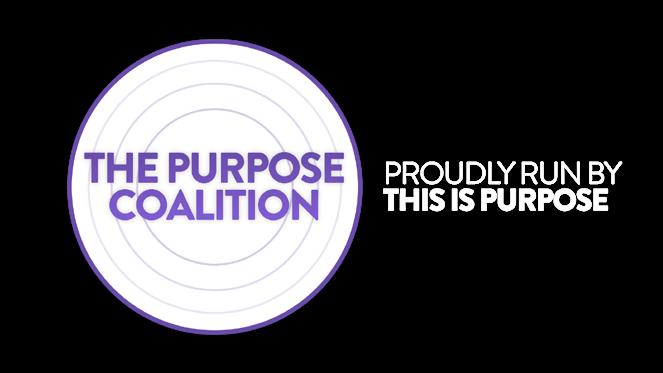





Chair of The Purpose Coalition and Former Secretary of State for Education
When we established The Purpose Coalition and developed the Purpose Goals framework, we set out with a clear mission: to tackle the root causes of inequality and unlock opportunity across every community in Britain. Central to this was the recognition that meaningful change requires more than good intentions - it demands committed partners willing to embed social purpose at the heart of their commercial strategy.
This report – E.ON’s second with The Purpose Coalition – demonstrates how the business is continuing to make equality of opportunity a priority.
The energy transition is not just about technology or policy; it’s fundamentally about places and the people who call them home. From the Silvertown district energy system transforming East London communities to the Coventry Strategic Energy Partnership pioneering AI-driven thermal imaging for residents, E.ON’s approach demonstrates a profound understanding that clean energy must work for every postcode, not just the privileged few.
Their commitment to place-based solutions is seen in projects that go far beyond energy supply. Whether it’s providing 11,000 books to primary schools in Coventry or using local partnerships to deliver green careers mentorship, E.ON recognises that breaking down barriers requires deep, sustained engagement with the communities they serve. This isn’t corporate social responsibility as an afterthought, it’s social purpose as a strategic imperative.
The scale of the challenges we face – from fuel
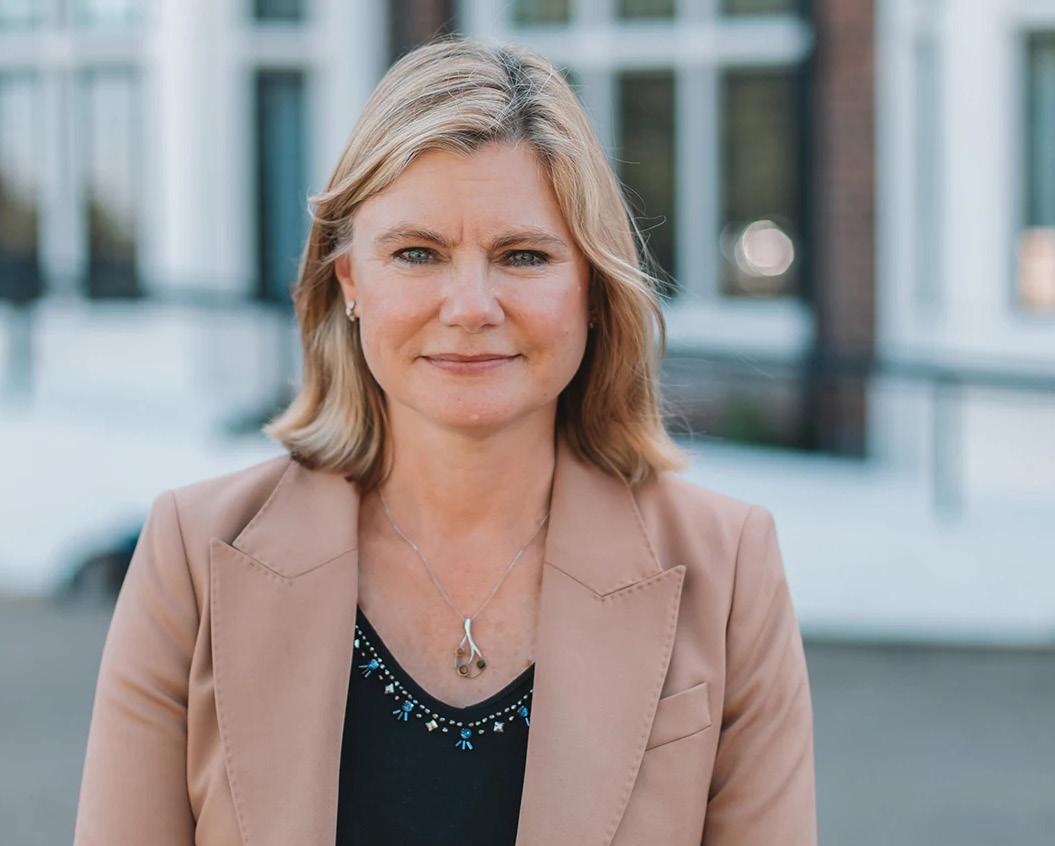
poverty to climate change – can’t be solved by any single organisation working in isolation. E.ON has embraced our Purpose Goals as a genuine framework for strategic decision-making. This report demonstrates how a major corporation can use the Goals to measure impact, guide investment and drive accountability across every aspect of their operations.
The results speak for themselves. E.ON’s Winter Affordability Scheme across winter 2024-25 involved identifying and contacting more than 38,000 financially vulnerable customers — delivering over £70 million of bill credits and debt relief, including £33 million of debt writeoffs. Committed to going further, £10 million was allocated via the E.ON Next Energy Fund to provide grants, appliance replacement, efficiency support and other wrap-around help. Looking ahead, E.ON are turning ambition into action with up to £2 billion of investment in the UK through 2028, reinforcing their mission to dismantle structural barriers and unlock real opportunity for communities.
Perhaps most importantly, E.ON’s leadership extends beyond their own operations. Its advocacy for a permanent Social Tariff, its push to end prepayment meter penalties and its championing of energy efficiency as national infrastructure demonstrate how purpose-led businesses can drive systemic change. I hope this report provides a practical example of how commercial success and social progress can go hand in hand, demonstrating how the benefits of transformational change can be felt by everyone.
0.2 Nick Forbes CBE Chair of the Breaking Down Barriers Commission and Former Member of Keir Starmer’s Shadow Cabinet
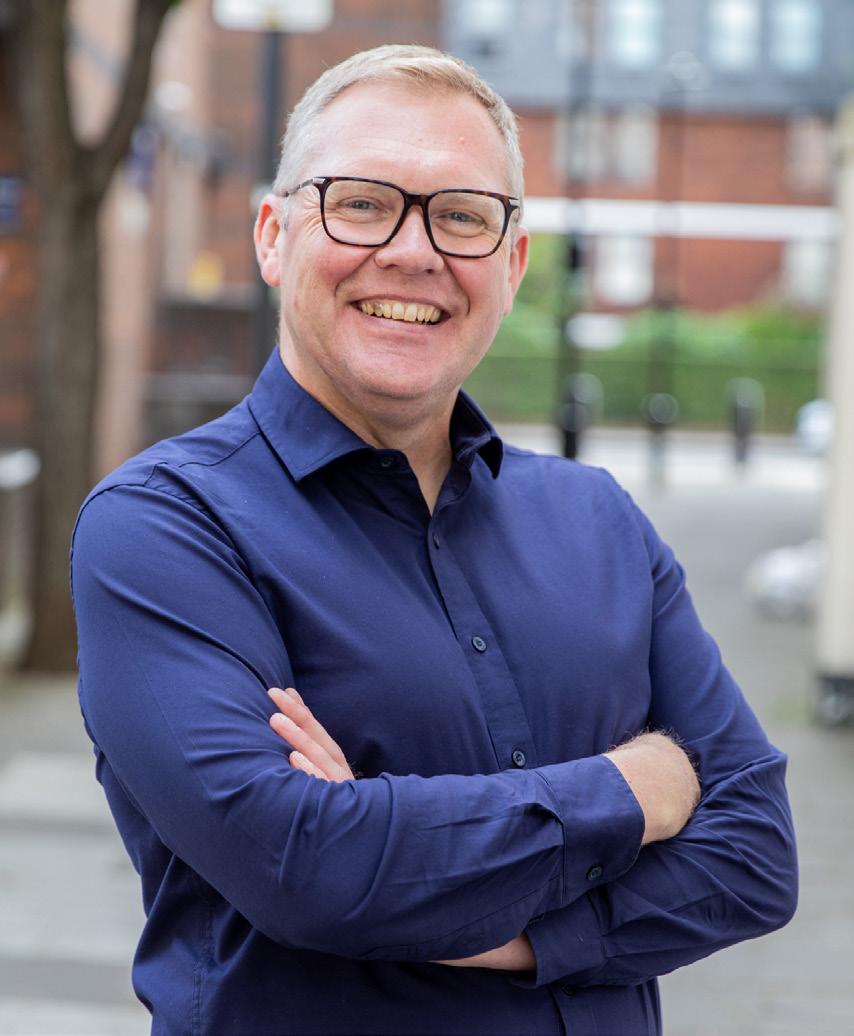
Growing up in the North East, I saw how structural disadvantages compound across generations, creating cycles of limited opportunity. Breaking them requires sustained intervention — and businesses embracing their power to drive social transformation.
The Breaking Down Barriers Commission exists because inequality is not inevitable; it stems from systems that can be changed. Change, however, depends on evidence — and E.ON is providing exactly that.
This report highlights six priorities that show how companies can confront inequality at its source. From providing debt forgiveness and vulnerability training to place-based clean energy projects, E.ON is demonstrating how commercial strategy can double as social infrastructure.
Crucially, its partnerships — with communities, charities and industry — show that sustainable change comes from embedded local relationships. By documenting outcomes and sharing learning, E.ON proves that investment in equality is not a cost, but a competitive advantage. Businesses that remove barriers to opportunity build stronger markets and more resilient communities — delivering both social and commercial returns.
The Breaking Down Barriers Commission exists because inequality is not inevitable; it stems from systems that can be changed. Change, however, depends on evidence — and E.ON is providing exactly that.
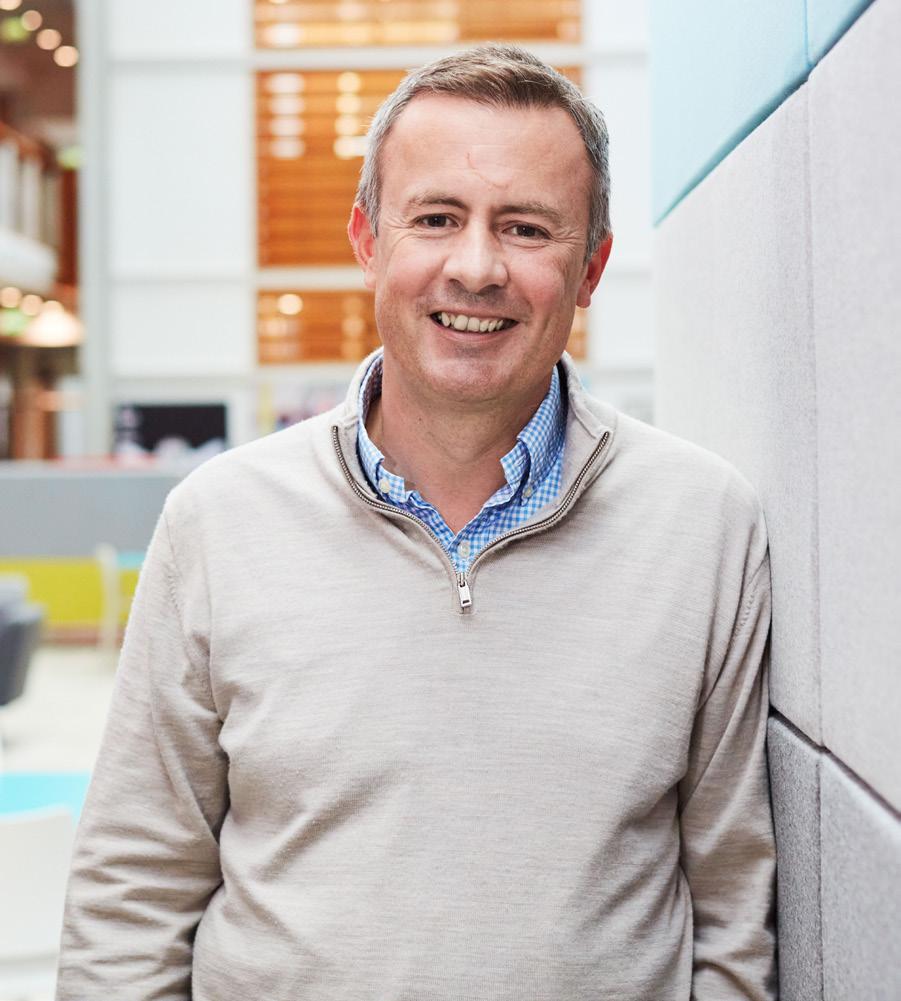
The transition to a cleaner, fairer – and more affordable – energy system must work for every household, business and community. Over the past year we’ve focused on action that delivers both immediate support and long-term change: from helping tens of thousands of customers with their bills through our Winter Affordability Scheme and Energy Fund, to nationally significant investment in low-carbon infrastructure through our Strategic Energy Partnership with Coventry City Council and London’s Silvertown ectogridTM district heating system.
What makes this progress distinctive is the way we deliver it: with partnership, purpose and people at the heart.
Working with The Purpose Coalition and aligning to the Purpose Goals help us target where we can remove barriers most effectively: whether that’s advocating for a permanent Social Tariff to ease the cost-of-living burden on vulnerable customers, addressing unfair standing charges, or scaling place-based solutions that cut bills and reduce carbon.
For me, the real highlight has been seeing how our colleagues bring this to life. Being named Top Employer of the Year by the Sunday Times for 16to 34-year-olds reflects not only our workplace culture, but the connection it fosters between how we treat our people and the impact we deliver for our customers and their communities. From frontline Energy Specialists supporting vulnerable households to engineers building clean energy infrastructure, their commitment is what makes these achievements possible.
That culture underpins our work with businesses too. Today, E.ON is one of the UK’s largest suppliers to industrial and commercial organisations. From on-site renewables and energy management technology to 24/7 renewables matching, we’re showing how sustainability and competitiveness can go hand in hand.
Place, Partners, Progress shows how commercial strategy and social value reinforce one another when purpose is at the core of decision-making. We’re proud of our progress, clear-eyed about the challenge, and determined to make new energy work, for everyone.
People power the energy transition. Our role is to build the capability, culture and partnerships that let colleagues thrive while supporting our customers and communities.
Over the past year we’ve expanded training for frontline teams – including in providing specialist support for vulnerable customers – and continued to invest in skills pathways like STEM Returners, apprenticeships, and leadership programmes that widen access and progression. We’ve also strengthened workplace policies that reflect real lives – from enhanced parental leave to support for carers and colleagues with non-visible disabilities – because fairness at work is the foundation of fairness in the services we provide.
The Purpose Goals give us a shared language to link colleague experience with community impact: from green skills mentoring in schools to local partnerships that improve homes, health and opportunities. For example, the Port of Liverpool solar project with Peel Ports, a case study in this report, combines engineering scale and sustainable growth with community benefit and student engagement.
We are entering a milestone year for recognising purpose-driven impact in the UK. We have hosted our first UK Playmaker Awards recognising those colleagues truly making a difference to delivering our purpose, and in November we’ll see the inaugural UK Safe and Well Awards. Meanwhile, our Apprenticeship and Skills Awards – now in their fifth year – continue to shine a spotlight on what real impact in skills and progression can achieve.
We are proud that across E.ON UK our internal and external recognition align. A real highlight has been that in 2025 E.ON UK was named Best Place to Work
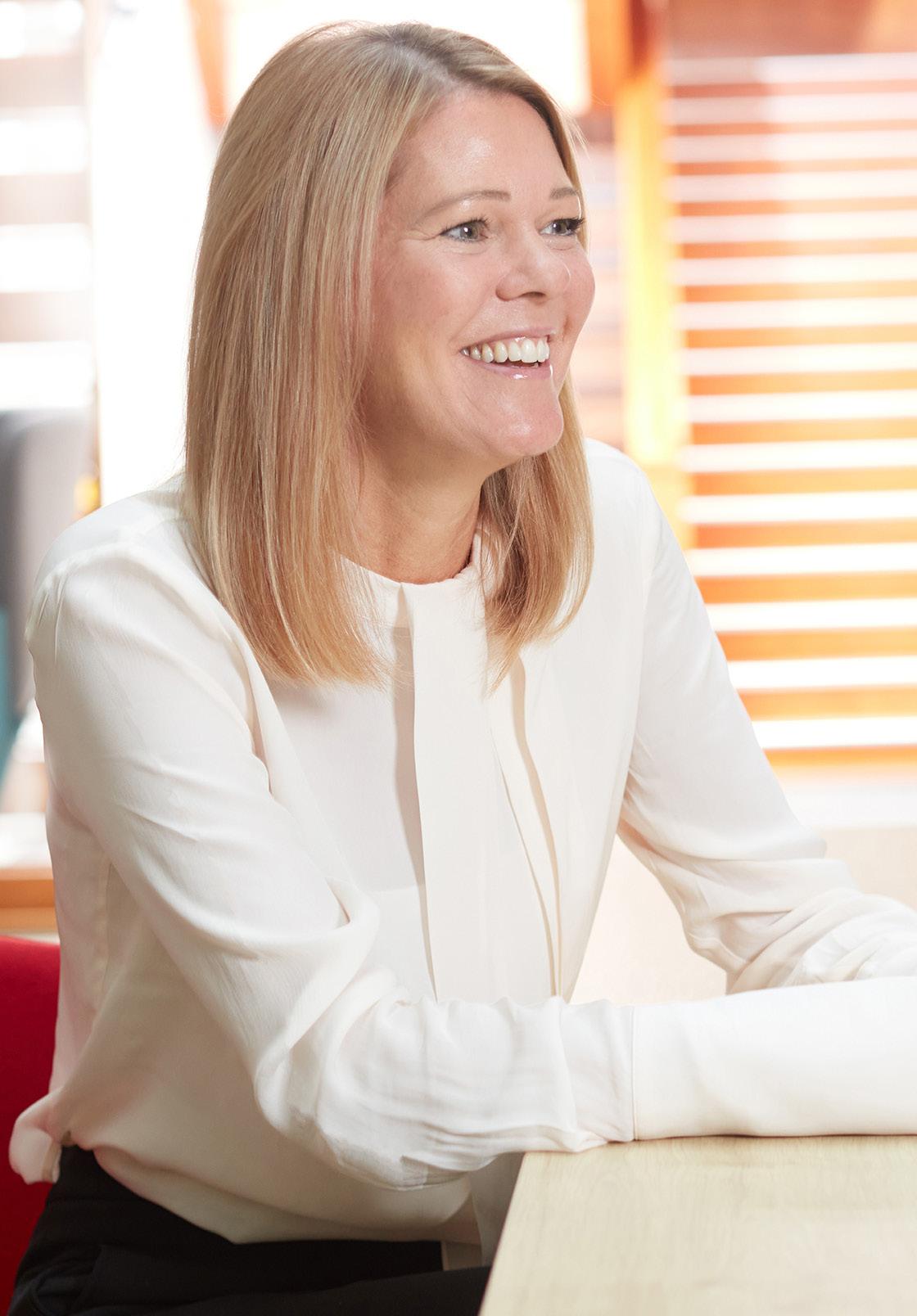
for 16- to 34-year-olds and ranked by The Sunday Times among the top 10 Best Places to Work overall, based directly on feedback from colleagues.
This recognition reflects both the ambition and reality of creating an inclusive, purpose-driven environment where young people in particular feel empowered to grow their careers.
As part of that, more than 1,300 colleagues have completed apprenticeships across 90 pathways in the UK since 2018, and we continue to expand the reach of our open-access development networks (instead of closed ’talent pools’) to unlock greater potential across the organisation.
By embedding inclusion, wellbeing and digital confidence across our workforce, we strengthen delivery on the ground – that is how we translate purpose into everyday progress.
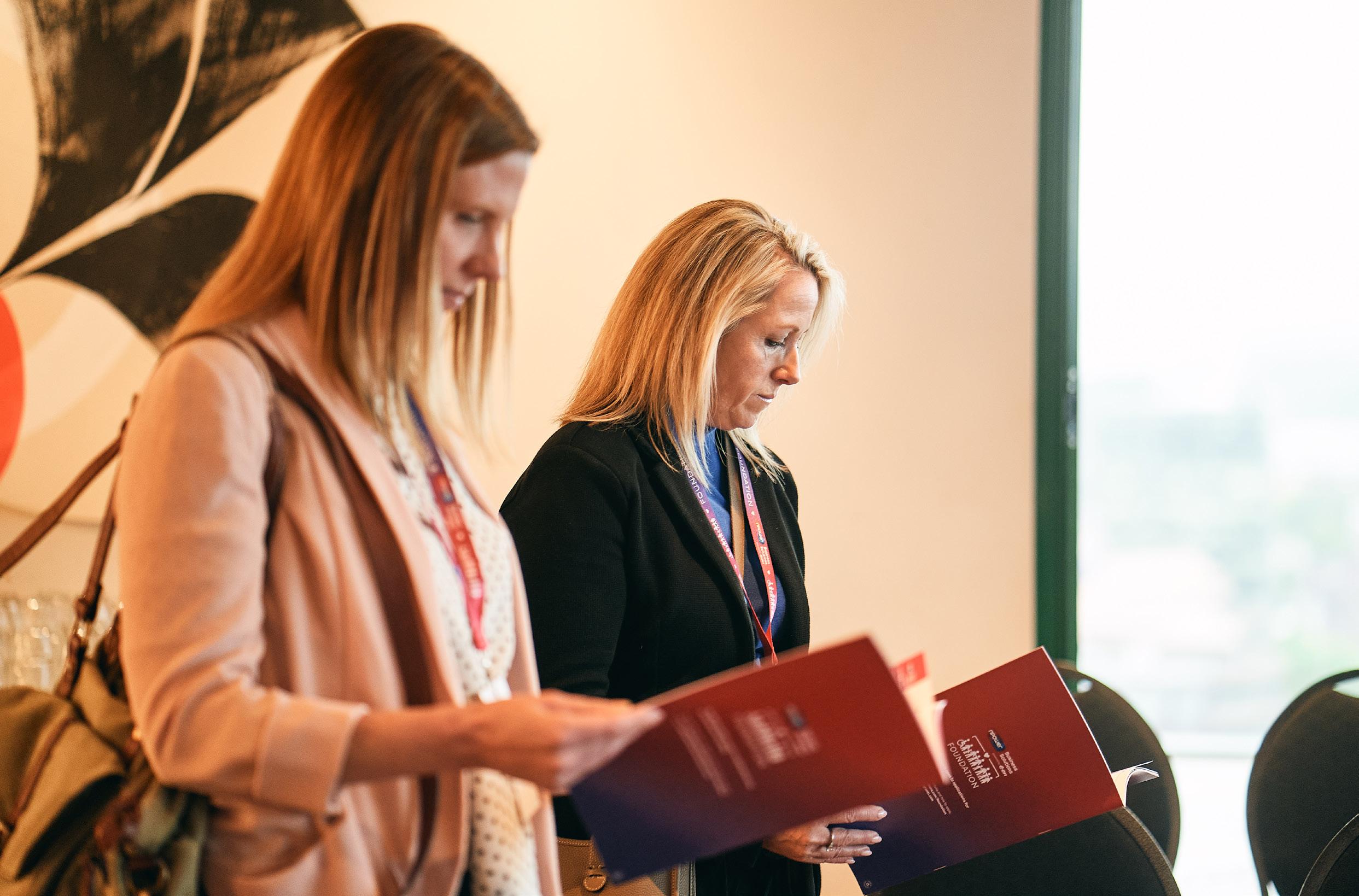
Place, Partners, Progress: E.ON’s 2025 Breaking Down Barriers Impact Report is published at a moment of continued challenge and growing opportunity. While the effects of the cost-of-living crisis remain present for many, momentum behind the clean energy transition is building, and there is a renewed national focus on creating a fairer, more inclusive society.
Within this context, E.ON continues to evolve as a purpose-led organisation – one committed to ensuring that the benefits of a new energy system are felt by everyone. At the heart of this commitment is a clear mission: “to make new energy work – for everyone.”
As part of a global energy leader serving 47 million customers, E.ON has a critical role to play in Britain. It now supplies energy to nearly one in seven households in the UK and is one of the country’s largest electricity suppliers to industry: giving it both the reach and responsibility to help shape
a more sustainable, affordable and accessible energy future.
This new report builds directly on the foundations laid in 2024 through People, Power and Purpose, E.ON’s first formal Impact Report developed in partnership with The Purpose Coalition. That report established a clear baseline for measuring social impact through the Purpose Goals and marked a shift towards embedding social purpose at the heart of E.ON’s strategy and decision-making.
Place, Partners, Progress moves that journey forward. It reflects on the progress over the past year, highlights new initiatives introduced to support households and businesses, and sets out how E.ON is working with others to remove the structural barriers that limit opportunity. The role of “place” outlines the importance of local delivery, “partners” highlights the value of collaboration across sectors and “progress” captures the shared momentum towards a clean energy transition.
This report is shaped around six key priorities that now underpin E.ON’s purpose-led approach:
• Supporting Customers Through the Cost-of-Living Crisis
• Shaping a Fairer, More Sustainable Energy Market
• Accelerating the UK’s Clean Energy Transition
• Enhancing Business Services through npower Business Solutions (nBS) and E.ON Infrastructure Solutions (EIS)
• Strengthening Partnerships for Community Impact
• Innovation, Advocacy and Thought Leadership
Each of these priorities reflects E.ON’s ambition to lead responsibly: using its scale, insight and expertise to help customers navigate immediate pressures while enabling longer-term change. Taken together, they represent a coherent, cross-cutting strategy for delivering social impact, accelerating decarbonisation and creating pathways of opportunity across the country.
The sections that follow map this progress in detail: showing how Place, Partners, Progress is enabling both driving E.ON’s commercial strategy and social impact, while contributing to the shared national goal of breaking down barriers in communities everywhere.
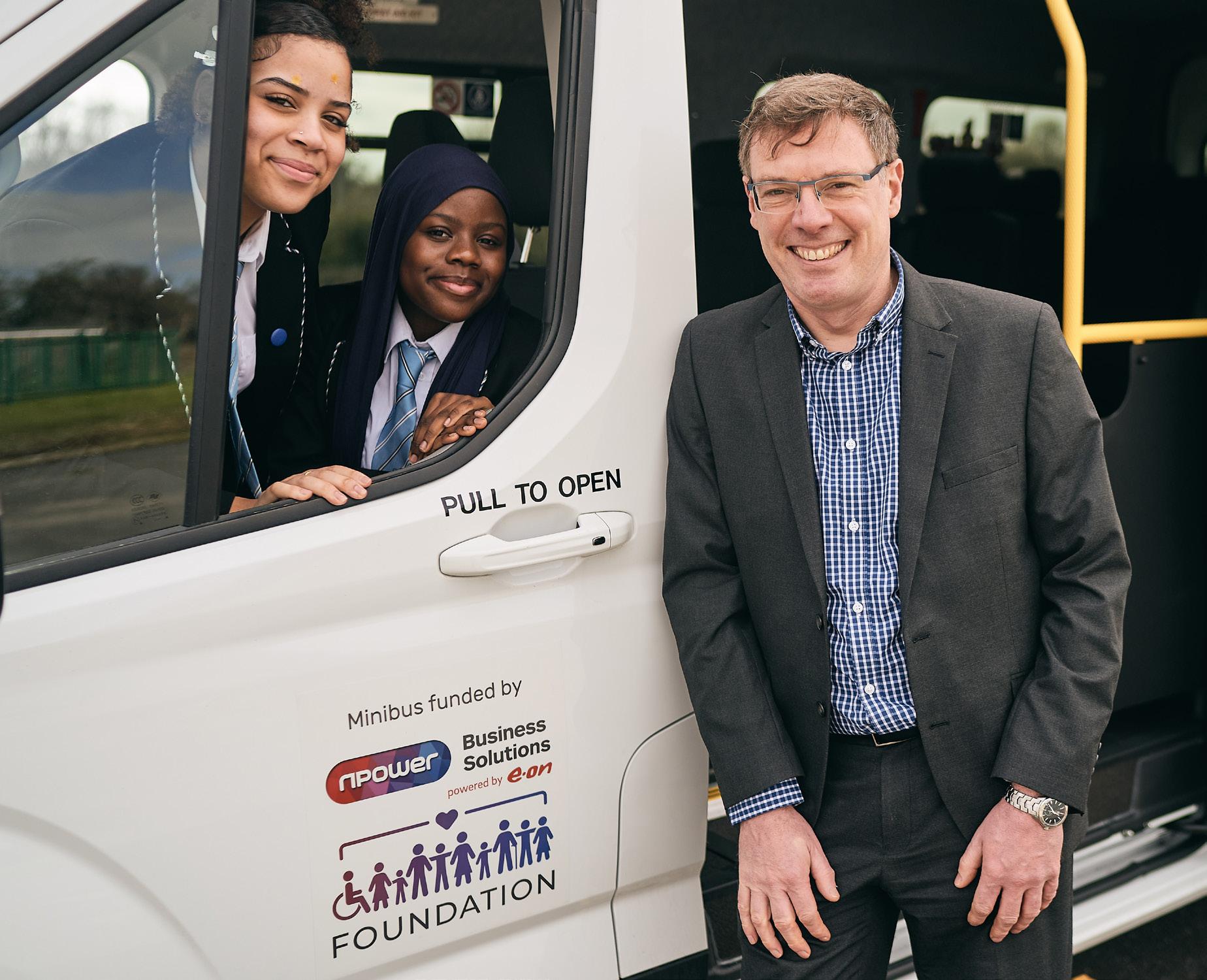
As a leading partner of The Purpose Coalition, E.ON has continued to embed the Purpose Goals across its strategy, delivery and external engagement. Developed under the leadership of former Education Secretary Rt Hon Justine Greening, the Purpose Goals provide a nationally recognised framework for tackling the root causes of inequality and driving long-term social impact.
Inspired by the UN Sustainable Development Goals – which were established in 2015 where Justine Greening led Britain’s delegation - but tailored specifically to the UK context, the Purpose Goals identify 15 core barriers to opportunity across the country.
The Goals are structured to reflect the key life stages and systemic challenges that shape an individual’s life chances, offering a clear framework for organisations to guide ambition, provoke action, and measure progress in boosting social mobility.
For E.ON, the Purpose Goals have become a strategic lens through which its social impact is assessed and understood. The company’s 2024 People, Power and Purpose report established a baseline assessment against 6 of goals – setting out where E.ON was already making a difference and where further action was needed. That foundation now informs this 2025 report, which tracks how the company’s activities over the past year have advanced key Purpose Goals and contributed to removing the barriers that hold people and places back.
Throughout this year’s report, E.ON maintains a clear and deliberate alignment with these categories: recognising that impact is strongest when commercial strategy, social value and national priorities are fully integrated. In particular, the report highlights strong progress in key areas:
• From relief to resilience: E.ON has moved beyond short-term bill support to embed lasting protections, combining financial help with advocacy for systematic reforms.
• Digital empowerment: What began as smart meter rollout is now a broader ecosystem of flexible tariffs, demand-side participation and passive battery pilots that make the energy system smarter and accessible.
• Infrastructure at scale: Projects such as London’s ectogridTM, decarbonisation and new battery hub show E.ON shifting from pilots to nationally significant assets that anchor the clean transition.
• Place-based leadership: Long-term partnerships, particularly in Coventry and Liverpool, demonstrate how local delivery blends infrastructure with education, skills and social value.
• Business transformation: Through nBS and EIS, E.ON is repositioning itself not just as a supplier but as a strategic partner, helping organisations decarbonise in commercially viable ways.
The Purpose Goals identify 15 core barriers to opportunity across the country.
Through rooting its activity in the Purpose Goals, E.ON ensures that its efforts to deliver affordable, sustainable energy are also contributing to a wider mission: one that is focused on opportunity, fairness and shared progress. This approach continues to distinguish E.ON as a business that is not only delivering essential services – but also helping to unlock potential and reduce inequality across the communities it serves.
In a year defined by economic pressure, accelerating climate change and a renewed focus on fairness, E.ON has continued to evolve its role as a purpose-led energy provider.
The activity that follows reflects a joined-up approach – combining immediate support for customers with long-term investment in clean energy, system reform and partnership-driven impact.
From helping households manage energy costs, to delivering low-carbon infrastructure and supporting inclusive growth in communities, E.ON’s work in 2025 shows that purpose is not an add-on but a necessity - our commercial goals can only be achieved by delivering social value at the same time.
1. Supporting Customers through the Cost-of-Living Crisis
E.ON recognises that affordable energy is the foundation of wellbeing and opportunity, and that no commercial success is possible if households are left struggling with basic energy costs.
• Across winter 2024-25, E.ON delivered over £70 million of support through its Winter Affordability Scheme, providing bill credits and debt relief to households across the UK.
• In addition, around £10 million was provided through the E.ON Next Energy Fund, offering grants, white goods, and wider support such as energy efficiency measures and boiler replacements — bringing total annual support to over £100 million when including wraparound initiatives.
2. Shaping a Fairer, More Sustainable Energy Market
E.ON believes that innovation can only deliver its full benefits if the energy market is fair, inclusive, and accessible to all households, not just those already digitally or financially advantaged.
• Through the Demand Flexibility Service, E.ON customers have collectively saved around £100 per household by shifting energy use away from peak times.
• E.ON continues to lead on the smart meter rollout, surpassing 5 million installations, and has called for vulnerable households to be prioritised.
• The company has also campaigned to rebalance standing charges, address the “loyalty penalty” and reform tariff structures so that consumer benefit comes first.
3. Accelerating the UK’s Clean Energy Transition
E.ON is clear that the journey to clean energy will only succeed if infrastructure projects deliver both environmental gains and social value, ensuring the benefits of the transition are widely shared.
• E.ON has launched the Next Gen Home pilot, bundling solar panels, heat pumps, batteries and EV chargers with no upfront cost.
• Flagship projects include the Silvertown ectogrid™, cutting emissions by up to 88%, Uskmouth battery storage, and the Port of Liverpool’s rooftop solar hub, one of the UK’s largest of its kind.
• These projects form part of a £2bn UK investment plan through 2028, with £700m already committed, enabling thousands of new green jobs and training opportunities.
4. Enhancing Business Services
E.ON understands that businesses are central to the energy transition and that only by partnering with them on long-term, commercially viable pathways can decarbonisation be delivered at scale. As a leader in the business energy market, nBS and EIS have the knowledge and technology to help businesses build resilience and profitability while lowering their carbon impact with its energy efficiency solutions. This is critical to the UK’s community and industrial energy transition.
• nBS is one of the UK’s largest industrial and commercial energy suppliers, serving around 24,000 business customers.
• Business can benefit from a range of offers including renewable PPAs, 24/7 carbon matching through Granular Energy, and turnkey solutions from solar to EV charging.
• The nBS Foundation has awarded £2.8m to 89 community projects and pledged a further £5m, linking business activity with wider social impact.
6. Innovation, Advocacy and Thought Leadership
5. Strengthening Partnerships for Community Impact
E.ON believes that the energy transition must be rooted in place, with trusted local partnerships that deliver visible benefits to residents and communities.
• E.ON’s 15-year Strategic Energy Partnership with Coventry is a national exemplar, combining retrofits, AI thermal imaging, and EV charging with literacy initiatives that delivered 11,000 books to primary schools.
• Partnerships with National Energy Action, StepChange and Age UK have extended targeted support to vulnerable households.
• The company also hosted clean energy engagement events for over 2,000 residents and students, strengthening local understanding and involvement in the transition.
The nBS Foundation has awarded £2.8m to 89 community projects
E.ON sees policy reform as essential to creating an energy system that is fair, resilient and aligned with the needs of households, businesses and the clean energy transition.
• CEO Chris Norbury has been a leading voice for a national Social Tariff, fairer standing charges, and embedding a “Consumer Duty” in energy, similar to that in financial services.
• E.ON engages directly with relevant government departments, Ofgem, NESO and Parliament, supporting reforms that align consumer protection with clean energy delivery.
• Its advocacy emphasises that clean energy is not only a climate imperative but also a driver of economic renewal and social fairness.
This section details E.ON’s key 2024/25 initiatives, underpinning the six strategic priorities. Each sub-section assesses the business’ achievements and leading case studies against key Purpose Goals.
3.1. Purpose Goal 8: Good Health and Wellbeing
Wellbeing is the foundation of everyone’s ability to access opportunity across Britain. But right now, the rising cost of energy is eroding that foundation — inflicting harm on health, security and future prospects in too many homes.
According to E.ON’s The Home Age report, 80% of UK adults already see gas and electricity as major contributors to household running costs.
E.ON’s targeted interventions — from multi-million-pound winter support funds to its campaigning leadership on a national Social Tariff — demonstrate that the organisation treats fuel poverty not just as a financial issue, but as a health one. Through these actions, E.ON is helping families live with dignity, security and better wellbeing, proving that affordable energy must be a cornerstone of social mobility.
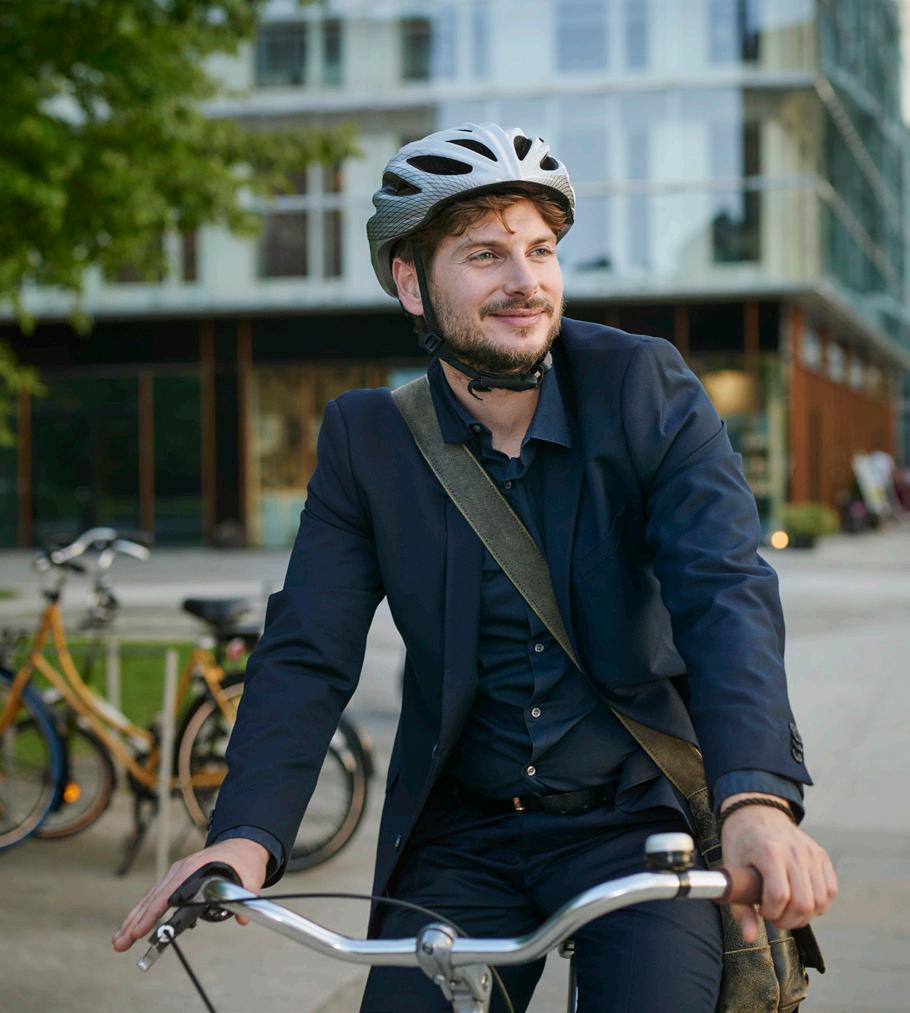
Crucially, E.ON Next has backed up purpose with scale: in 2024 it allocated over £70 million to support more than 38,000 vulnerable customers via its Winter Support Scheme — offering direct relief, debt write-offs and efficiency upgrades. In pilot programmes, the company is combining financial support with home improvements — insulation, more efficient appliances, solar and battery installations — to reduce households’ long-term energy burden.
E.ON is helping families live with dignity, security and better wellbeing
This is the kind of systemic, dignity-centred action we need: alleviating immediate strain and reshaping how energy affordability links to health, equity and opportunity.

In a period of sustained high energy costs, E.ON has prioritised direct financial assistance for those most at risk of fuel poverty.
Through winter 2024–25, E.ON delivered around £100 million of targeted support for customers struggling with energy costs. The level of debt write-off allocated averages approximately £2,900 per customer through its Winter Affordability Scheme and around £10 million from the E.ON Next Energy Fund, alongside additional wrap-around measures such as white goods replacements, boiler support, and energy efficiency improvements.
E.ON also played a key delivery role in distributing over £80 million through the government’s Warm Home Discount, helping more than 500,000 customers manage their winter energy bills. Complementing these national efforts, a further £10 million was made available through the E.ON Next Energy Fund, offering grants and essential appliance replacements to households in crisis. These combined measures form part of a broader commitment to reducing financial strain and helping vulnerable households maintain access to safe, warm homes.
E.ON’s approach to customer support goes beyond direct financial relief. Over the past year, it has invested in scaling its frontline capability, recruiting over 1,000 additional customer service colleagues, including more than 200 trained Energy Specialists. These teams provide tailored guidance and support to all those who need it, including non-customers. This includes setting up manageable payment plans, as well as referring customers to trusted partners like StepChange and Kidney Care UK.
Working with The Wise Group, E.ON has continued to expand its support to include income maximisation services, fuel vouchers and energy efficiency advice.
Customer service teams have widened their remit, offering not only tailored payment plans but also direct energy-saving advice and signposting to trusted charities for additional support. This personalised outreach ensures households receive both immediate relief and longer-term guidance.
Digital tools are also playing an increasingly important role: more than 70,000 wellbeing checks were completed in partnership with TellJO, helping identify emerging needs before they escalate. Smart meter installations have now surpassed 5 million, providing customers with better insight into their usage and enabling participation in demand flexibility programmes that help reduce costs.
E.ON’s
approach to customer support goes beyond direct financial relief.
Alongside operational delivery, E.ON has taken a strong energy policy stance in favour of making energy more affordable for households and businesses. It continues to advocate for a permanent, co-funded targeted support scheme that would provide a consistent safety net for low-income and medically vulnerable customers. It is working closely with government and the regulator to support the design of a national model including how the Warm Home Discount design could evolve during the rest of the Parliament.
E.ON is also exploring ways in which electricity costs could be reduced over this Parliament for households and some SMEs who are not in scope of enhanced energy bill support signalled by the updated Industrial Strategy.
E.ON has also called for a broader review of market regulation, including reforms to Ofgem’s price cap methodology, in order to better protect consumers from price volatility. It has proposed further wholesale market reform and improvements to the retail framework to ensure that fairness, innovation and resilience are embedded into the future energy system.
Alongside this, E.ON has strongly backed Ofgem’s temporary debt relief schemes, recognising their value as short-term protection for those most in need. The company has argued that these measures should act as a bridge to permanent, industry-wide protections such as better targeted financial support and installing green technologies like batteries which can deliver year on year bill savings for vulnerable customers.

3.1.4.
E.ON Next’s Energy Efficiency Advice Centre continues to act as a key gateway for customers navigating complex energy support schemes. Advisors guide individuals through eligibility checks for the Energy Company Obligation (ECO4 – energy efficiency and heating measures), the Great British Insulation Scheme (GBIS) and the Warm Home Discount, while also offering high-quality, NVQ Level 3 energy efficiency advice. This support is often tailored to a customer’s specific needs, based on property type, heating system or energy habits, and is available to both E.ON customers and non-customers through wider referral partnerships.
Its Field Operations Team, also plays a frontline role in helping customers. Colleagues are equipped to recognise a spectrum of vulnerabilities — from safeguarding concerns to fuel poverty — and are enabled to act with empathy and practicality beyond their core technical responsibilities. E.ON also maintains a 24/7 emergency response line, extending critical support to customers outside standard industry hours. Year-on-year reductions in emergency callouts suggest that early interventions and energy-saving upgrades are making a tangible difference.
E.ON has strongly backed Ofgem’s temporary debt relief schemes.
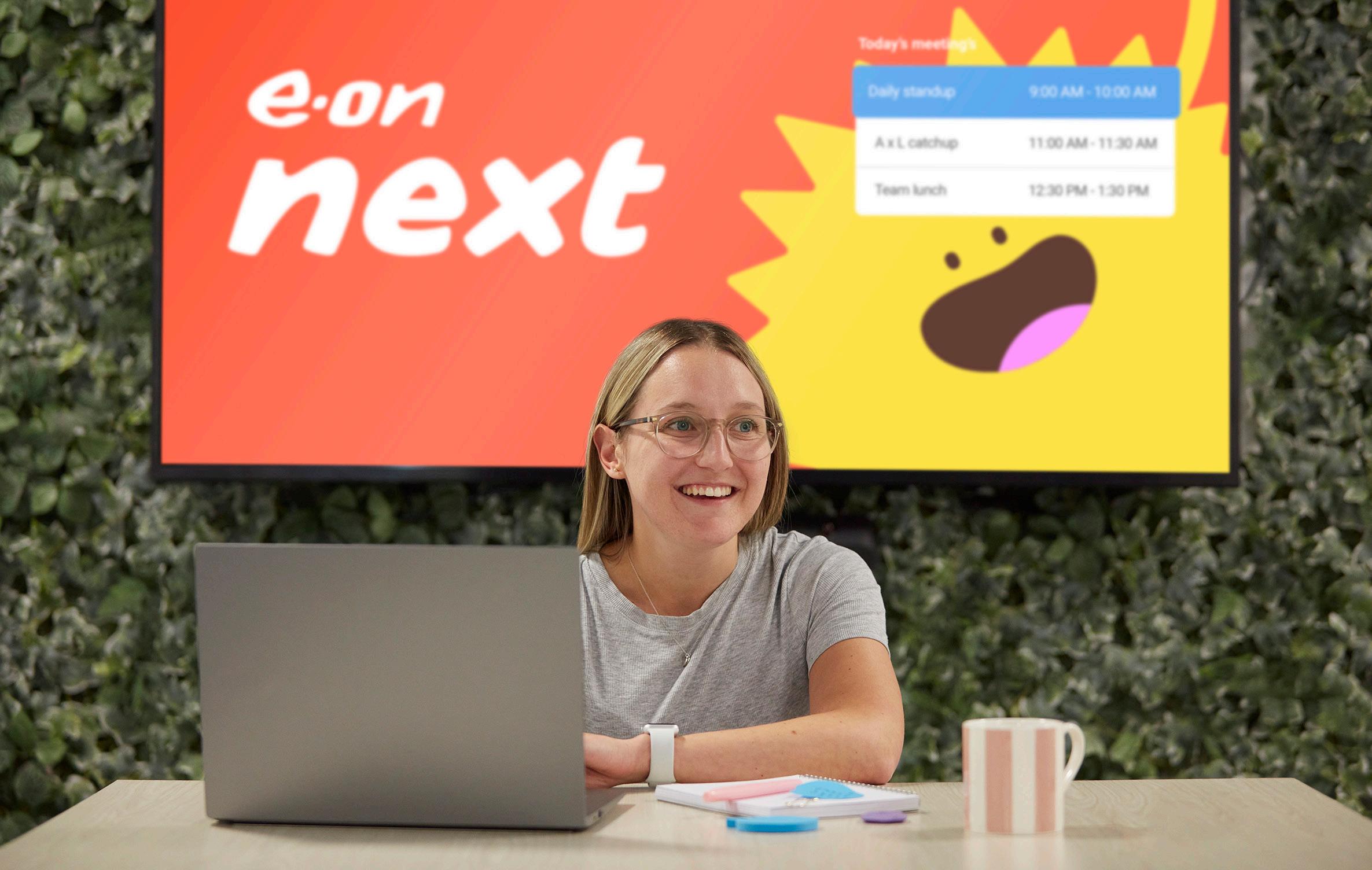
E.ON recognises that long-term affordability cannot be achieved without addressing deeper structural barriers.
One of these is the continued under-uptake of smart meters among older people, tenants and lower-income households, often due to concerns about data or technical reliability. In response, E.ON has invested in empathetic field engagement and mythbusting, while also using new time-of-use tariffs to demonstrate the savings potential of smart-enabled energy.
It has also increased its focus on education-led engagement, using schools and community spaces to build awareness of energy efficiency from an early age. Initiatives have included energy advice competitions for schoolchildren and home energy learning activities designed to promote intergenerational change.
To prevent future debt escalation, E.ON is working with partners on the development of a household energy score. This would give earlier visibility of
vulnerability, enabling suppliers and regulators to intervene before arrears become unmanageable.
Looking ahead, E.ON is supporting policy reform to include domestic battery installations in the next phase of government-backed retrofit schemes. Trials in Coventry have shown that customers can save up to £400 per year by shifting usage to off-peak times, even without solar panels. Alongside this, E.ON is working with Charis Grants to provide low-income households with efficient appliances like slow cookers and essential white goods.
Partnerships like E.ON Next’s collaboration with Amazon Fresh bring energy-saving messages into everyday life, with co-branded materials and app-based tips helping households cut costs in simple, practical ways.
In many cases, these services are extended to non-customers through local authority referrals, reflecting a broader commitment to supporting the UK energy system, not just its own customer base.
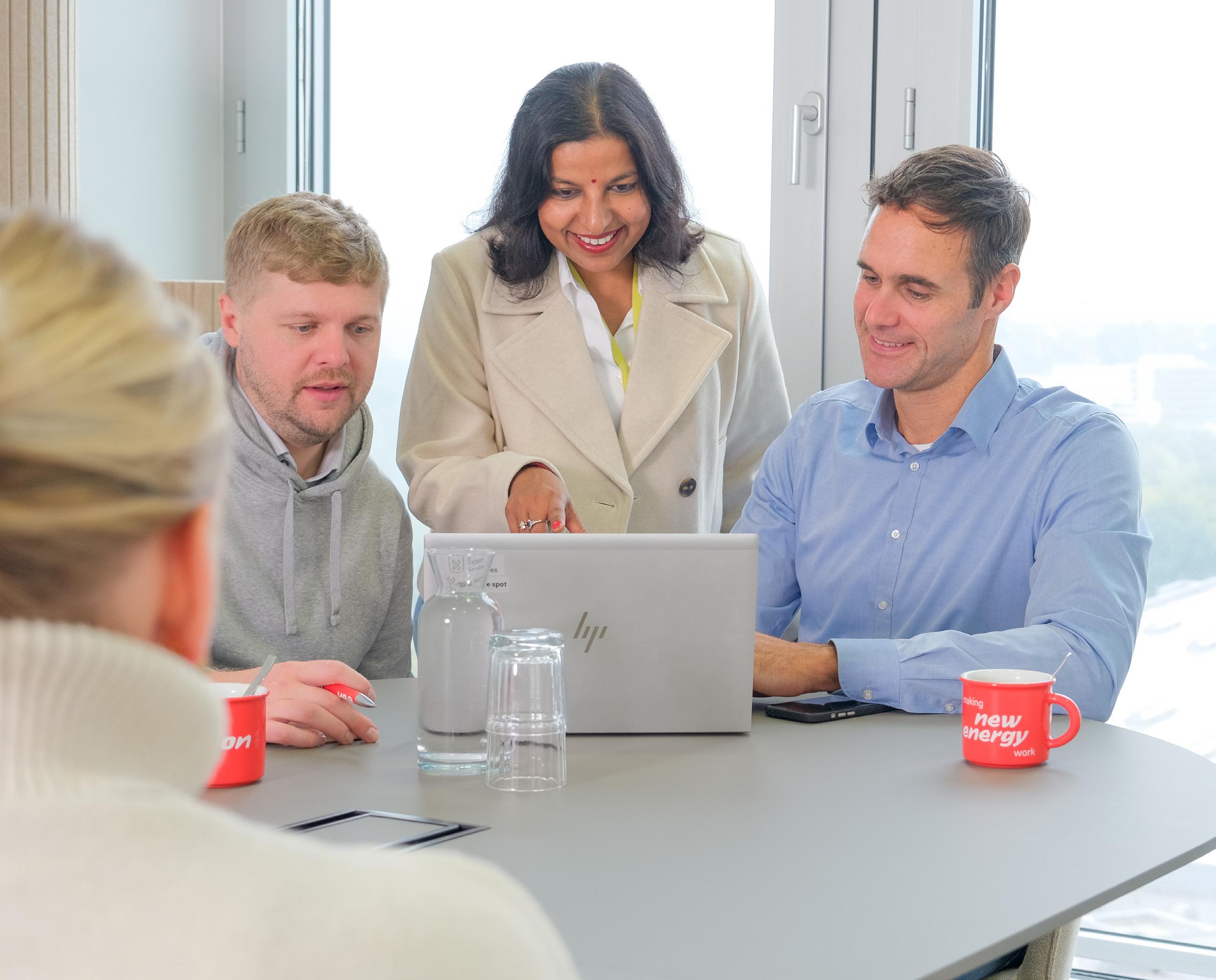
3.2. Purpose Goal 10: Closing the Digital and AI Divide
As the energy market becomes increasingly digital, E.ON recognises the risk that innovation could leave some communities behind.
Its approach is to turn this challenge into opportunity: piloting inclusive digital tools like energy management apps, investing in
AI-driven customer solutions and exploring how data can lower costs rather than create complexity. This work ensures that households and businesses alike can benefit from a smarter system, demonstrating that digital progress and fairness can reinforce each other.
E.ON’s ambition to shape a more sustainable energy market is grounded in the belief that digital tools must work for everyone, not just early adopters or high-consumption households.
Throughout 2025, it has continued to expand access to smart tariffs and digitally enabled savings, including its time-of-use and EV-specific plans, which help customers reduce costs by shifting demand to off-peak periods. These tariffs are underpinned by smart meter technology, which has now been installed in millions of homes and acts as a gateway to real-time insight, flexible pricing and tailored advice.
The rollout of new products such as the Next Smart Saver tariff, supported by an interactive Alexa reminder feature, shows how digital engagement can simplify energy management for households. Customers receive prompts to shift usage at off-peak times, lowering bills while supporting grid flexibility.
Participation in the Demand Flexibility Service also increased in 2025, with customers using E.ON’s digital platforms to automate usage reductions during peak times and earn bill credits.
The benefits of flexibility are wide ranging, allowing households to save money, support grid stability and participate in decarbonisation through everyday behaviours and choices, all powered by accessible digital infrastructure.
Through the “City as Lab” project with the University of Nottingham, E.ON is integrating real-world energy data into a 3D digital twin of the city. This approach pinpoints households most at risk of fuel poverty and tests targeted solutions, ensuring interventions are directed where they are needed most.
Looking ahead, E.ON is one of the first UK energy providers exploring quantum computing. In partnership with IBM, it is testing applications from optimising EV charging to advanced energy forecasting. This frontier technology could one day enable faster, smarter and more resilient energy systems that leave no community behind.
3.2.2.
At the heart of E.ON’s advocacy is a recognition that the benefits of a digital-first system must be deliberately extended to those who are least connected.
It has provided evidence to consultations on energy affordability, local flexibility markets and consumer protection, drawing on data from its own digitally enabled pilots. E.ON also contributed to the future Warm Homes Plan with proposals for opening up future government schemes to innovative technology solutions which have the potential to both lower bills and support the energy transition for everyone.
Looking ahead, E.ON is one of the first UK energy providers exploring quantum computing.
In its advocacy work, E.ON has pushed for reforms to the energy price cap that better reflect the support needs of low-income customers. It has also campaigned to make the energy market fairer, such as making the case for the Ban on Acquisition only Tariffs (BAT) to be an enduring feature of the market, and finding the right balance over how costs which suppliers incur from other parts of the value chain are ultimately recovered from customers.
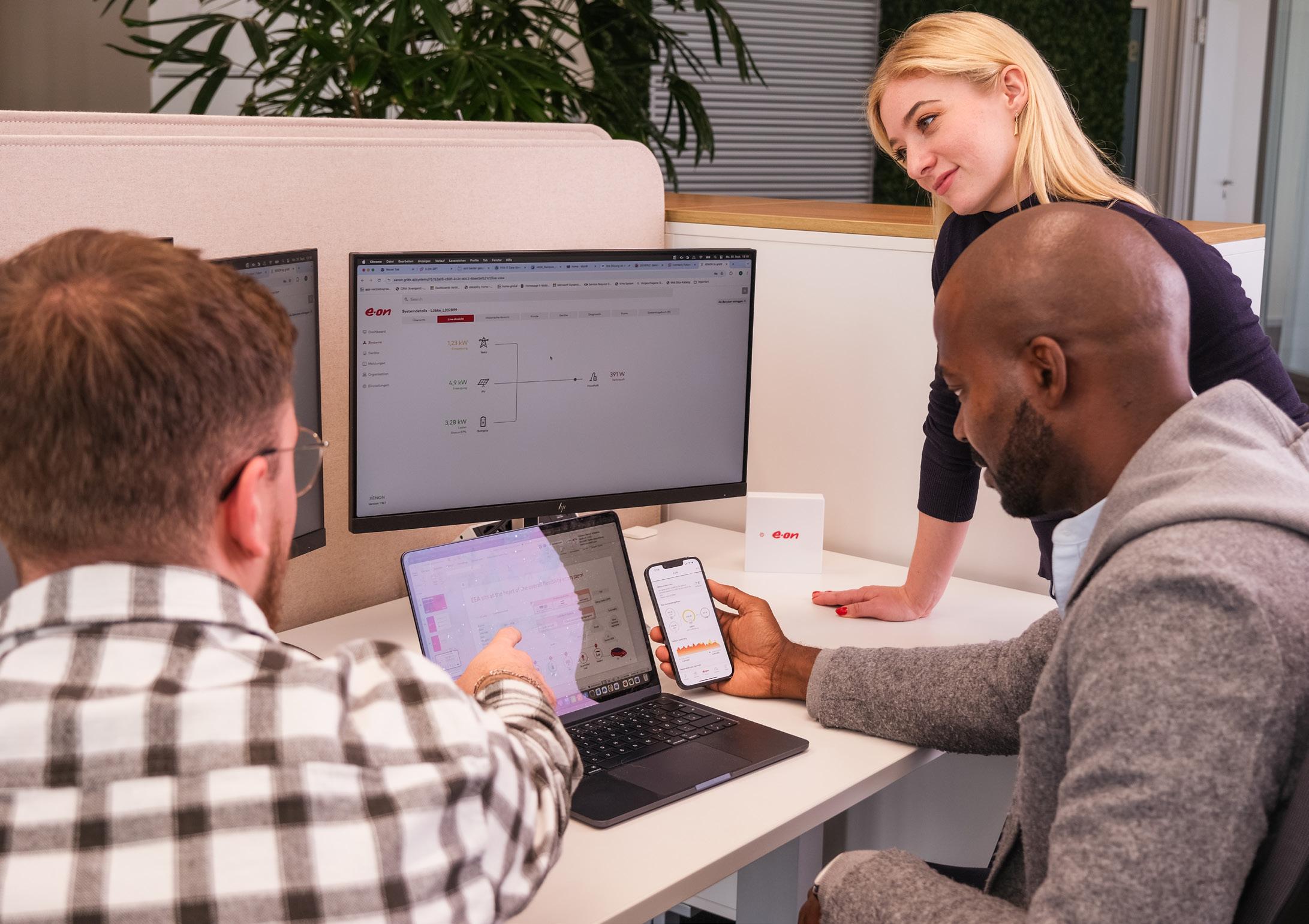
E.ON recognises that not all households have the capacity or confidence to actively manage their energy use through apps or real-time dashboards. That insight has shaped its design of passive digital participation: systems that deliver savings without requiring daily engagement. In Coventry, E.ON’s domestic battery pilot enabled automatic off-peak energy use, resulting in average annual savings of up to £250, with no customer interaction needed.
This approach also informed its partnership with Northern Powergrid in areas like Starbeck and Keadby, where households in grid-constrained zones received free battery installations and guaranteed monthly savings. Customers benefit from the underlying smart technology, while E.ON earns flexibility revenues from the distribution network operator.
Alongside passive battery pilots, E.ON has distributed free smart thermostats and personalised home energy reports to low-income customers, ensuring disadvantaged households benefit from digital energy savings without additional cost.
Digital exclusion in the energy transition is not only about skills or connectivity: it’s often embedded in housing infrastructure. Millions of people in apartment buildings have historically been locked out of solar and energy management technology.
E.ON’s investment in SolShare, a platform developed by Allume Energy, directly addresses this challenge by enabling shared rooftop solar with real-time usage allocation across individual flats.
Integrating solar distribution into digital metering systems, SolShare allows households in social housing and flats to benefit from clean energy without the need for additional equipment or specialist knowledge. Early adopters have seen bill reductions of up to 36%, and the technology is already helping to reshape how digital fairness is embedded in the architecture of the built environment. This is one of several ways E.ON is using data and digital platforms to ensure smart, sustainable systems are also structurally inclusive.
While E.ON continues to lead in digital infrastructure, it also recognises that cultural awareness and trust are essential. Many households remain unclear about how smart systems work, or why they matter.
E.ON’s partnership with Veloci Racing has evolved into a creative campaign to close this knowledge gap, using storytelling and inclusive branding to make clean energy feel relevant, engaging and culturally resonant. This includes promoting gender representation and youth involvement, especially in communities often underrepresented in technology and sustainability spaces.
At the local level, E.ON is supporting councils and communities to turn digital potential into practical impact. In Coventry, drone-enabled thermal mapping, smart battery pilots and realtime optimisation tools are being used to target upgrades and improve public building efficiency. The Next Gen Home pilot, meanwhile, bundles solar panels, heat pumps, EV chargers and smart home energy management into a single package: offered to customers without upfront costs, and managed through a digital platform that automates optimal energy use.
Many households remain unclear about how smart systems work, or why they matter.
Nationally, the launch of the New Energy Academy, developed with direct input from teachers and students, is building climate literacy and green skills in schools. Its nationwide Trailblazing Heroes competition has inspired 11–14 year-olds to celebrate global and local climate champions, while linking learning directly to future green careers.
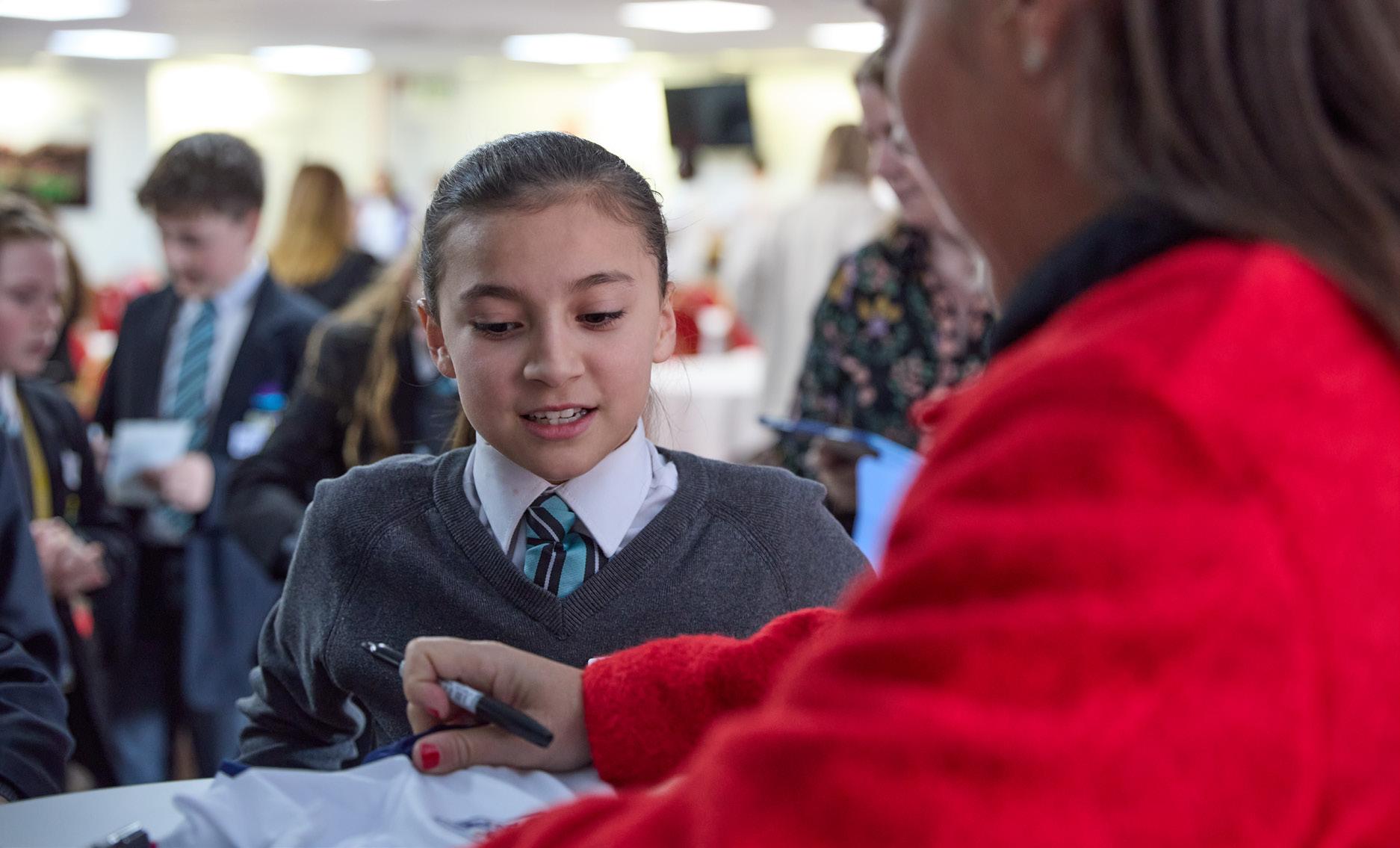
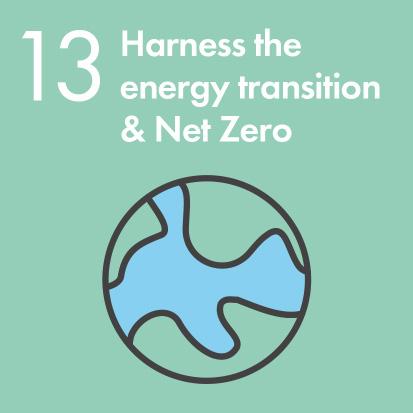
The clean energy transition is a once-in-ageneration opportunity to create new industries and pathways to prosperity and opportunity.
E.ON is advancing this agenda not only by deploying renewable and decentralised energy projects, but also by advocating for a clean energy transition that accounts for affordability and fairness. From workplace apprenticeships linked to sustainability roles, to large-scale partnerships such as Port of Liverpool solar with Peel Ports, E.ON shows how decarbonisation can simultaneously cut emissions, stimulate economic growth and widen access to opportunity.
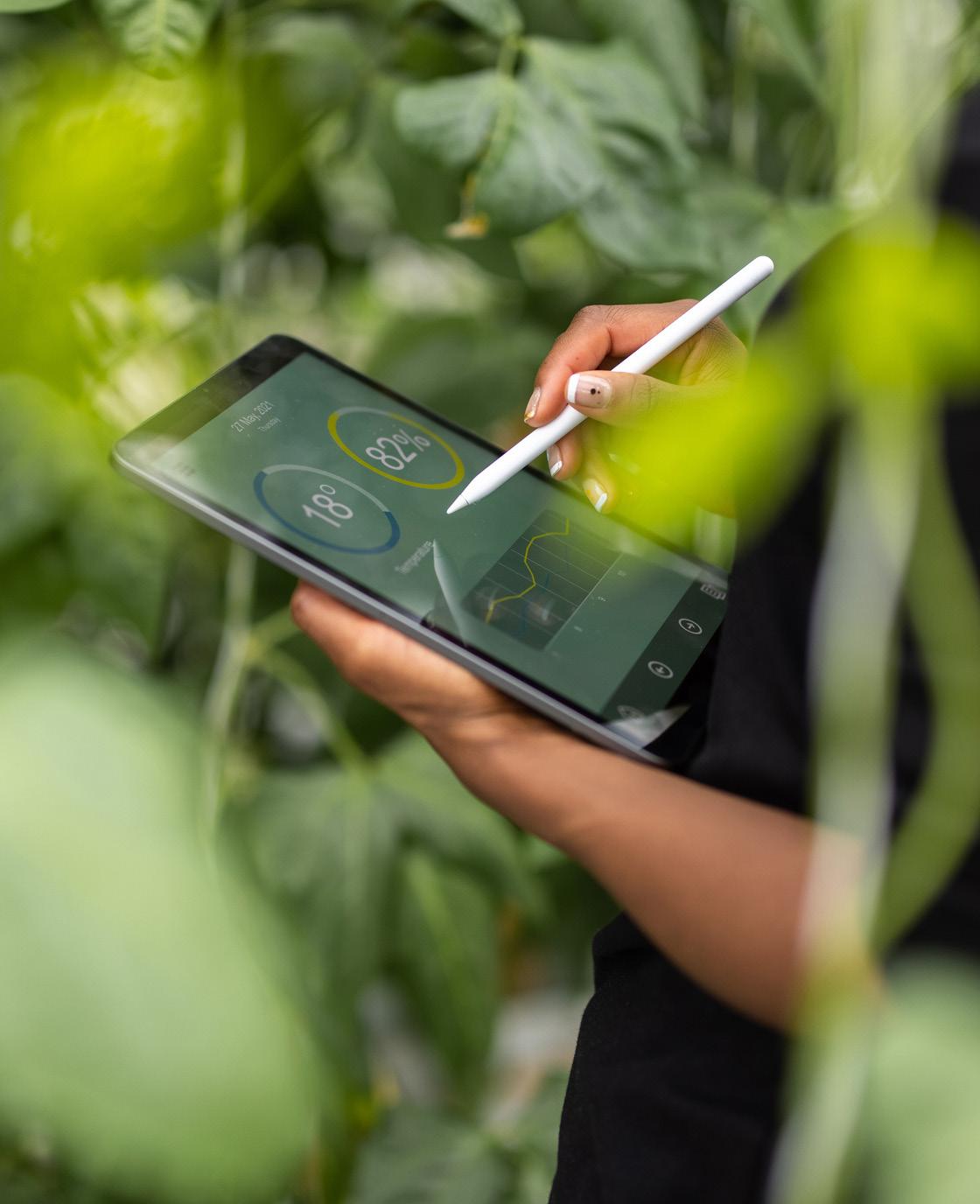
E.ON has significantly accelerated the delivery of smart, low-carbon technologies into homes, pairing rapid deployment with the digital tools needed to maximise their impact.
Building on over a decade of leadership in residential energy efficiency, E.ON has now installed approximately 1.5 million measures, including insulation and efficient heating systems, enabling long-term savings estimated at over £10 billion for UK households.
Critically, E.ON has integrated these technologies with smart tariffs and digital optimisation tools, allowing households to schedule EV charging, battery usage or appliance activity at the cheapest and cleanest times of day.
It also continues to scale the rollout of heat pumps, supported by remote diagnostics and app-based controls that give users simple, intuitive access to low-carbon heating.
With over 5 million smart meters installed to date, E.ON’s infrastructure now enables real-time energy monitoring and flexible energy management for millions of homes.
These projects form part of E.ON’s £2 billion UK investment plan to 2028, with £700 million already committed. E.ON is leading in its level of ambition in the UK currently, and it represents one of the largest dedicated programmes of its kind. This scale of commitment underlines both the investment required to build reliable, inclusive low-carbon infrastructure and E.ON’s unique role as a market leader willing to deliver it.
Through its Energy Infrastructure Solutions (EIS) division, E.ON is delivering the backbone of the clean energy transition to large scale organisations across Britain. This includes district heating to large-scale battery storage, powered by digital control and real-time performance insight.
E.ON is also working with clients to shift high-heat industrial processes away from natural gas. While these solutions are often not commercially viable without support, E.ON is focused on wrapping generation, storage and heat decarbonisation into comprehensive commercial models that deliver environmental impact and cost control.
Blackburn Meadows in Sheffield is E.ON’s biomass-fuelled combined heat and power plant, it uses recycled waste wood sourced from within the UK to generate 30MW of electrical energy and up to 25MW of thermal energy, to power homes and businesses in the South Yorkshire region. Through partnerships with Yorkshire Water and Maregaglia Steel E.ON are pioneering new ways of capturing waste heat from industrial processes for use in district heating. Similarly, the HYDESS project is testing renewable hydrogen for steelmaking, showing how industrial clusters can decarbonise while supporting local jobs.
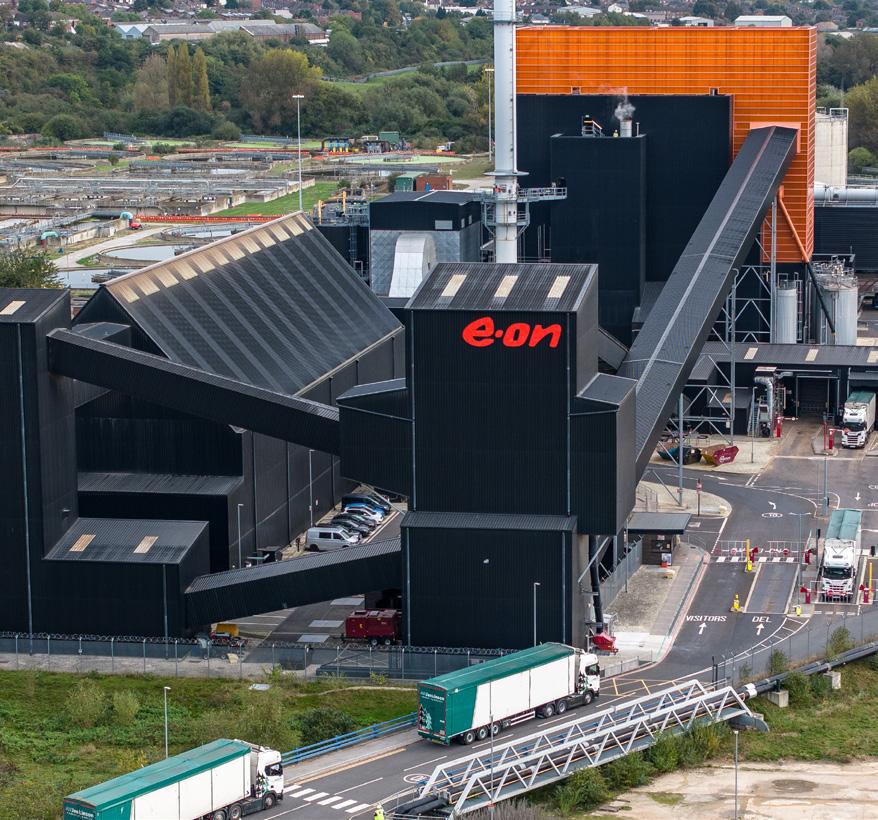
In 2025, E.ON expanded its portfolio of low-carbon heat networks, providing sustainable energy to public buildings, university campuses and housing estates, all supported by digital monitoring platforms that optimise flow, temperature and energy use across complex networks.
To future-proof these efforts, E.ON has invested in emerging technology providers. New equity partnerships with companies such as Naked Solar and Amber are enabling integration of solar generation, dynamic pricing and smart battery control: moving beyond standalone assets to full digital orchestration of decentralised energy.
Recognising that millions of UK households lack driveways, E.ON has piloted the EV Hover: an overthe-pavement charging arm enabling terraced homes to join the electric revolution. Alongside ultra-rapid hubs in Wales and Scotland, this innovation ensures EV infrastructure is built with inclusion in mind.
The Uskmouth battery development, currently underway, will be one of E.ON’s most advanced grid storage projects to date, helping to stabilise the network and increase renewable energy penetration. In every case, digital capability is embedded not as an add-on, but as a foundation for scale, reliability and customer benefit.
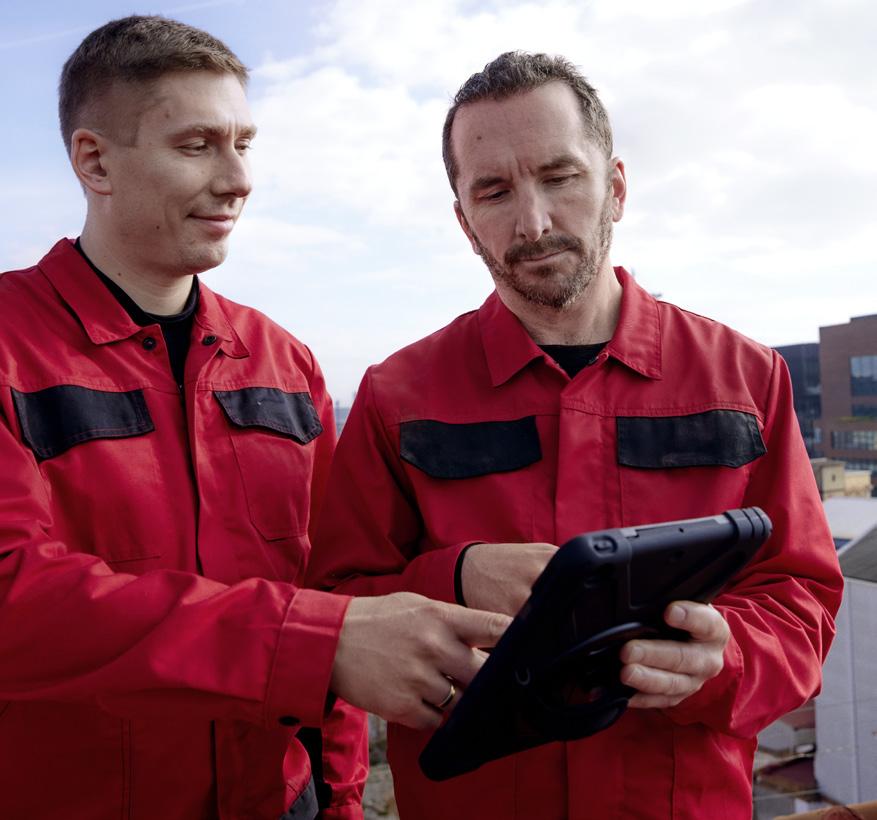
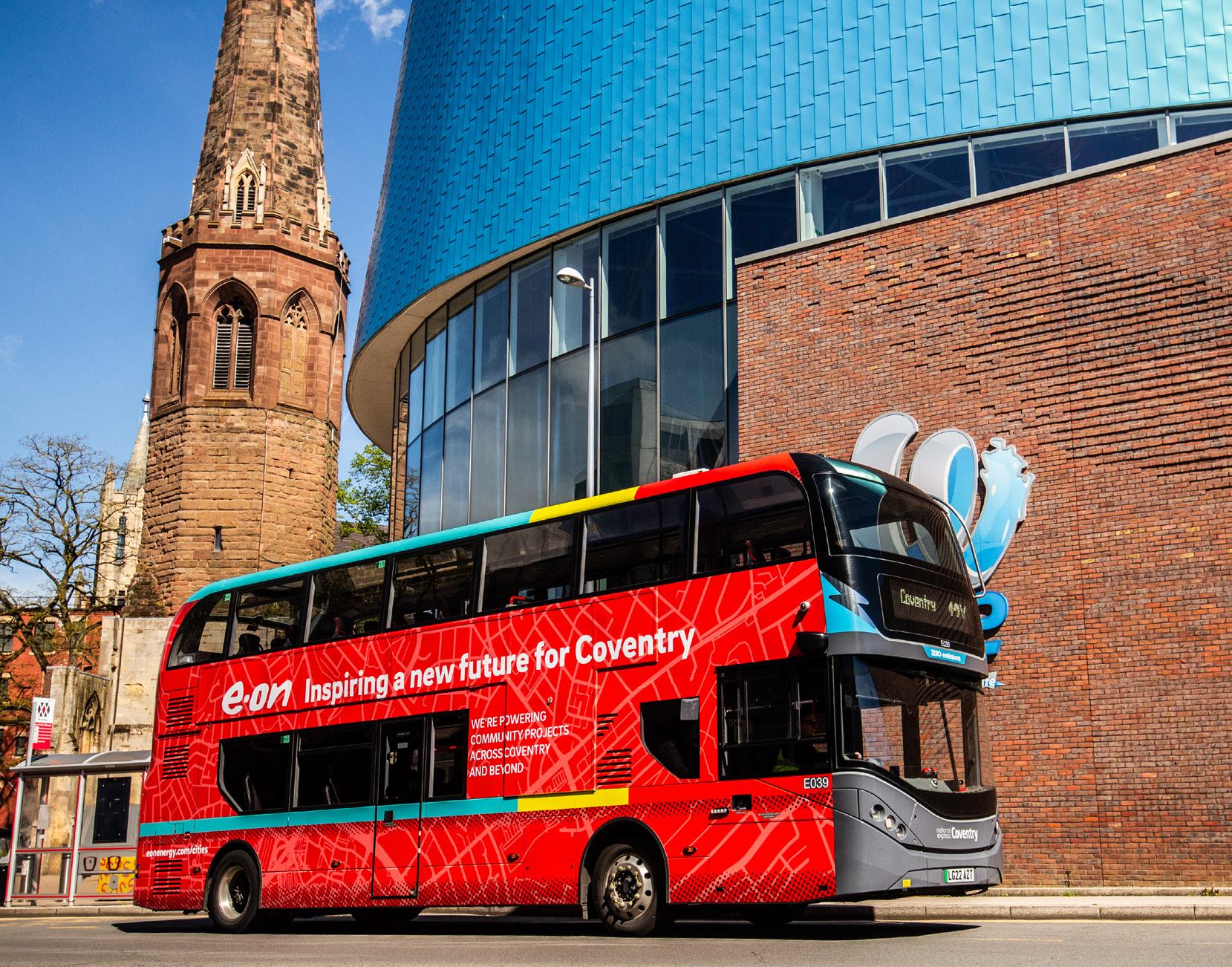
In a recent ground-breaking pilot launched in recently in Coventry, E.ON provided domestic battery storage to financially vulnerable households at no upfront cost. These batteries, charged during off-peak periods and discharged during peak demand, are fully automated and require no interaction from the user. This ‘passive flexibility’ approach allows customers to reduce their energy bills without needing to engage in complex behaviour change or digital interfaces.
Participants in the pilot saved an average of £250–£300 annually on energy bills, and some households stood to save as much as £6,000 over the 20-year lifespan of the battery. Crucially, the pilot targeted communities that are often excluded from energy innovation. E.ON also reinvested part of the system benefits into tailored energy advice and support services.
The pilot was recognised at the 2025 Utility Week Awards for innovation and inclusion. It also serves as a policy demonstration project, showing how demand-side flexibility can be delivered at scale and embedded into future Warm Homes strategies.
E.ON continues to demonstrate the importance of place-based collaboration to deliver clean energy in ways that reflect local needs and priorities.
The flagship 15-year Strategic Energy Partnership with Coventry City Council mentioned in the 2024 report remains a national exemplar, combining smart technology deployment with community benefit.
In 2025, this partnership saw the rollout of solar panels on public buildings, the retrofitting of homes using digital thermal imaging and AI diagnostics, and the development of a citywide EV charging strategy informed by real-world travel patterns and electricity grid data.
More widely, from the British Library’s rooftop solar heat installation to the Elephant Park district heating scheme in London, E.ON is proving that even heritage buildings and dense urban neighbourhoods can transition to sustainable, low-carbon energy without compromising character or accessibility.
These interventions are supported by E.ON’s local energy mapping tools and data platforms that identify the most effective interventions for carbon reduction and bill savings. Similar work with other local authorities and housing associations is helping extend these benefits to the communities most in need.
In every case, the goal is not only to decarbonise infrastructure: but to do so in a way that is digitally accessible, community-informed and aligned with social value objectives.
E.ON continues to demonstrate the importance of place-based collaboration to deliver clean energy in ways that reflect local needs and priorities.
E.ON’s long-term Strategic Energy Partnership (SEP) with Coventry City Council represents a pioneering model of place-based collaboration that links together decarbonisation, community wellbeing and inclusive growth.
Launched in 2023 and set to run for 15 years, the partnership is designed around four strategic pillars: clean local energy, innovation at scale, green jobs and skills and direct community benefit.
In 2025, the partnership has already delivered significant impact. Coventry now has more public EV charge points per capita than any UK city outside London and is well on its way to becoming the country’s first all-electric bus city. Drone-based thermal imaging surveys have helped the Council and E.ON target heat loss hotspots with precision, allowing for focused retrofit interventions under the Home Upgrade Grant scheme.
On top of infrastructure, the partnership has worked to break down opportunity barriers on the ground. E.ON engaged over 2,000 students through clean energy-themed education sessions, distributed 11,000 books to local primary schools to promote literacy and aspiration, and supported school retrofits to improve energy efficiency and learning environments.
Governance of the partnership is formalised through annual business planning and a published Coventry Energy Plan, ensuring continued transparency and strategic alignment.
Moving forward, the partnership stands as a replicable blueprint for how local authorities and the energy sector can co-deliver long-term clean energy and social outcomes.
E.ON’s clean energy projects are delivered through an integrated commercial and operational structure designed to ensure speed, accountability and digital performance tracking from start to finish.
Its Energy Infrastructure Solutions division operates with a clear division between precontract sales and post-contract delivery: allowing dedicated focus at each stage, while maintaining continuity.
Within delivery, the commercial team monitors the real-time performance of operating assets, ensuring that contracts are fulfilled, customer expectations are met and systems run at optimal efficiency.
This digital approach enables rapid fault detection, remote diagnostics and optimisation of load balancing and energy delivery. It is not only a technical model, but a strategic one: by embedding data-led performance management into every project, E.ON is strengthening the business case for low-carbon infrastructure that is financially viable and operationally robust.
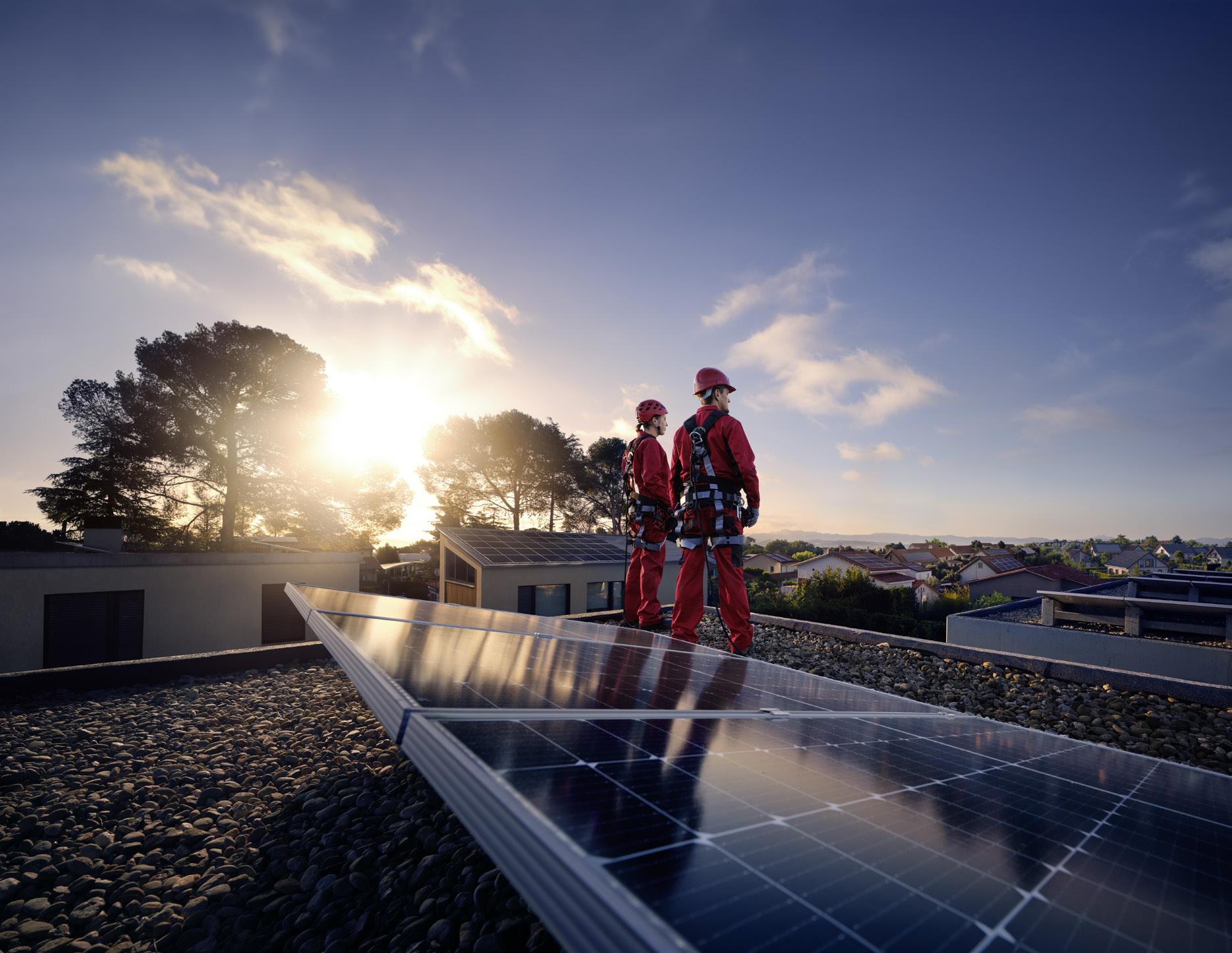

E.ON recognises that the clean energy transition is not only a technical shift, but a peoplepowered one: requiring investment in digital skills, opportunity and career pathways right across the sector. This will be explored in detail in E.ON’s 2025 Inclusion Report, which sets out how the company is reshaping workplace culture and policies: from colleague-led networks and inclusive leave to skills programmes that widen access to green careers.
Throughout 2024/25, the organisation has continued to prioritise workforce diversity and development through key work that reflects the evolving demands of a smart energy system.
The STEM Returners programme provides opportunities for professionals with science and engineering backgrounds to re-enter the workforce after a career break: supporting both reskilling and digital capability within the sector.
The Fast Forward network promotes women into leadership roles, while the E.ON’s strategic talent programmes supports progression for ethnic minority colleagues. Each of these initiatives is backed by mentoring, training and senior sponsorship.
Crucially, many of these programmes incorporate digital upskilling, from energy analytics and smart system design to customer technology support, ensuring that E.ON’s workforce reflects the technical demands of a decarbonised, digital energy future.
This internal investment in skills mirrors E.ON’s wider belief: that clean energy must be inclusive by design, and that a digitally fluent, representative workforce is essential to delivering that vision.
3.4.
Opportunity is rooted in place: in the homes, communities and businesses where people live and work.
Through its business energy services (npower Business Solutions, nBS) and Energy Infrastructure Solutions (EIS), E.ON is helping towns and cities to decarbonise in ways that also drive economic renewal. From installing smart local grids to enabling flexibility in industrial operations, the company is demonstrating how sustainable infrastructure is not only an environmental investment but also a catalyst for stronger, more resilient communities.
E.ON’s approach to homes and buildings is grounded in a belief that energy infrastructure must be responsive to the people it serves.
This people-centred design ethos is applied not only to residential users, but also to business and institutional clients. Its customer experience teams draw on platforms and user research to streamline journeys and personalise offers. Whether enabling a manufacturer to optimise energy use or helping a housing association plan an upgrade, E.ON’s focus is on building systems that are intuitive, accessible and aligned to real-world needs.
E.ON’s goal is not just energy efficiency, but community-aligned energy design: where data, user insight and lived experience shape delivery.
Across the UK, E.ON is deepening long-term partnerships with cities and local authorities to co-design energy systems that align with community priorities.
As mentioned previously, nowhere is this more evident than in Coventry, where E.ON’s Strategic Energy Partnership has evolved from infrastructure delivery into a broader collaboration on local regeneration and civic pride.
In Lincolnshire, E.ON’s collaboration with Lincolnshire Housing Partnership has combined home retrofits with investment in community spaces, including a new playground in Immingham. This integration of infrastructure and neighbourhood value shows how the energy transition can strengthen the social fabric of local places.
In 2025, E.ON has supported projects led by organisations like Green Hustle Community Interest Company (CIC): enabling a city-wide green festival that combined environmental learning with direct community benefit, from free school haircuts to homelessness outreach. These interventions sit alongside major retrofit and solar installations, using energy programmes as vehicles for social connection and community identity.
Digital infrastructure plays a central role here: thermal mapping, local energy dashboards, and building controls are deployed not only to reduce emissions, but to enable smarter planning and local accountability. Embedding systems into the fabric of communities, E.ON is helping communities transition in a way that is visible, inclusive and meaningful.
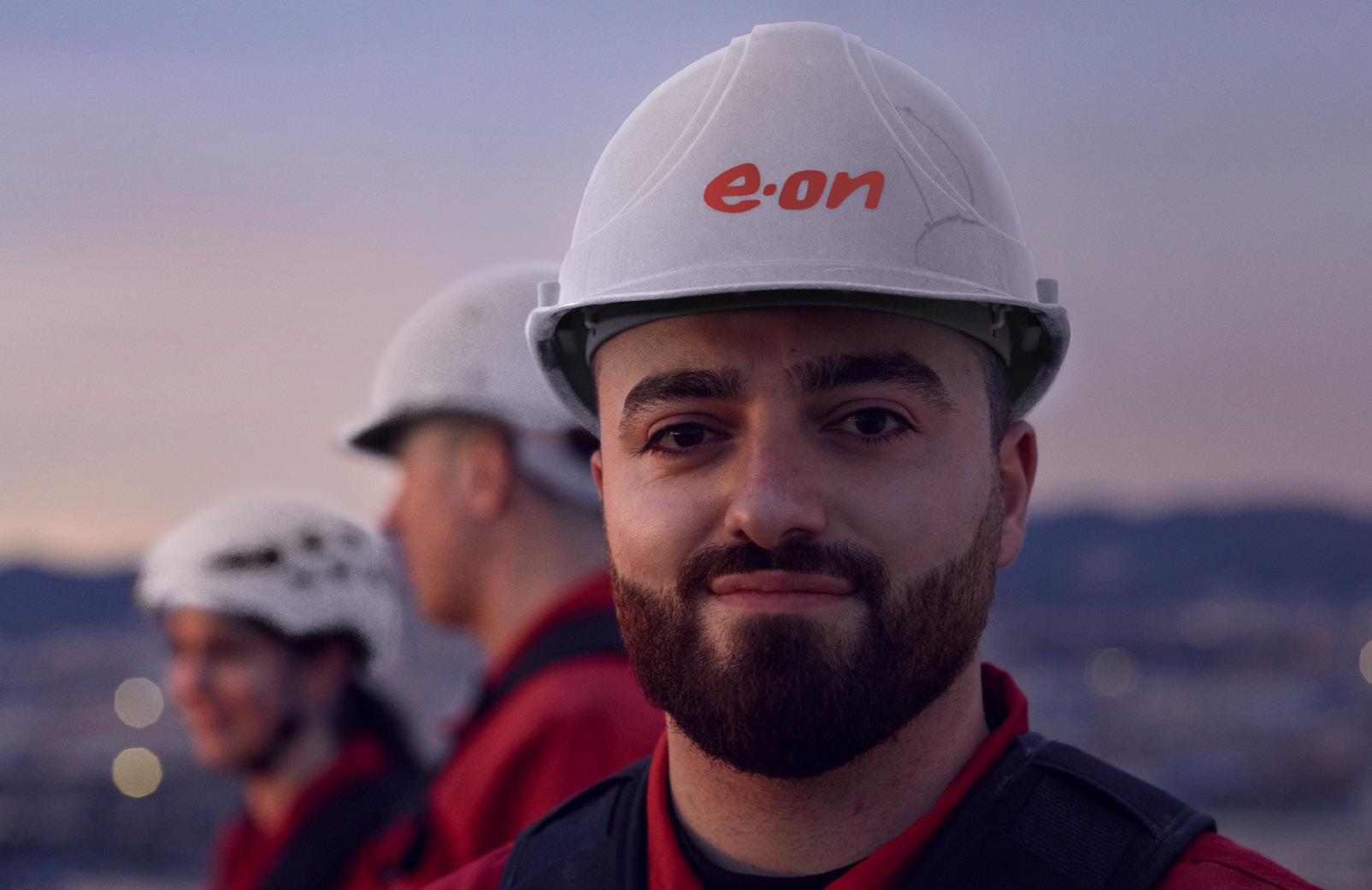
E.ON is delivering the UK’s largest roof-mounted solar project across the Port of Liverpool in partnership with Peel Ports Group: a landmark initiative not only for clean energy generation, but for its community impact and social value.
Peel Ports recognised the need to improve their local reputation and reduce the environmental footprint of one of the UK’s busiest freight hubs. E.ON responded with a strategy that combined industrial decarbonisation with deep community engagement.
Logistically, the project adopted a zero road miles model: materials were shipped directly into the port to reduce freight congestion and local disruption. Local contractors were engaged for critical elements such as scaffolding, a contract worth £5 million, and ongoing maintenance planning includes collaboration with local employment services in Sefton.
More widely, working with local Hugh Baird College, E.ON is using the work to break down the barriers to opportunity across Liverpool. Students were brought on site to gain direct insight into complex engineering delivery, helping to raise aspirations and improve pathways into green careers.
This project stands out as a replicable model where environmental ambition, industrial scale and social value have been aligned within the design of a business-to-business partnership.
3.4.3. Making commercial buildings smarter and more efficient
E.ON continues to advance the UK’s clean energy transition by delivering bespoke energy solutions to both domestic and commercial customers.
It works closely with commercial partners in sectors like food and beverage to design holistic decarbonisation pathways: integrating solar and wind generation, energy efficiency, heat decarbonisation (through heat pumps) and energy flexibility.
These packages are built not as isolated technologies but as interconnected systems designed to deliver clean energy while remaining commercially viable. This customerled, technology-agnostic approach reflects E.ON’s ambition to be a long-term strategic partner rather than a single-solution provider.
New analytics services from npower Business Solutions give industrial and commercial clients real-time visibility of their carbon footprint. By identifying savings opportunities and linking energy use directly to competitiveness, these tools demonstrate how sustainability and profitability can align.
Through E.ON Control Solutions, E.ON’s specialist building management systems (BMS) division, the organisation is helping public and private sector clients to digitise, decarbonise and optimise their estates. These systems are essential to reducing energy waste, improving comfort, and unlocking cost savings across schools, offices, supermarkets and campuses.
Each project is data-driven: BMS installations give facilities managers real-time insight into Heating, Ventilation and Air Conditioning (HVAC) systems, occupancy and energy load. Sites like Parrs Wood High School in Manchester and a number of national Tesco locations have seen substantial performance improvements as a result. This kind of digital control also supports transparency and futureproofing, enabling integration with EV charging, solar PV and storage and aligning with Environmental, Social and Governance (ESG) reporting needs.
Importantly, E.ON is helping shape national standards through its role in the Building Controls Industry Association. In advocating for baseline performance requirements, it is working to ensure every building can access the 30% energy savings BMS can deliver, turning what is currently a market of mixed levels of application into a national norm.
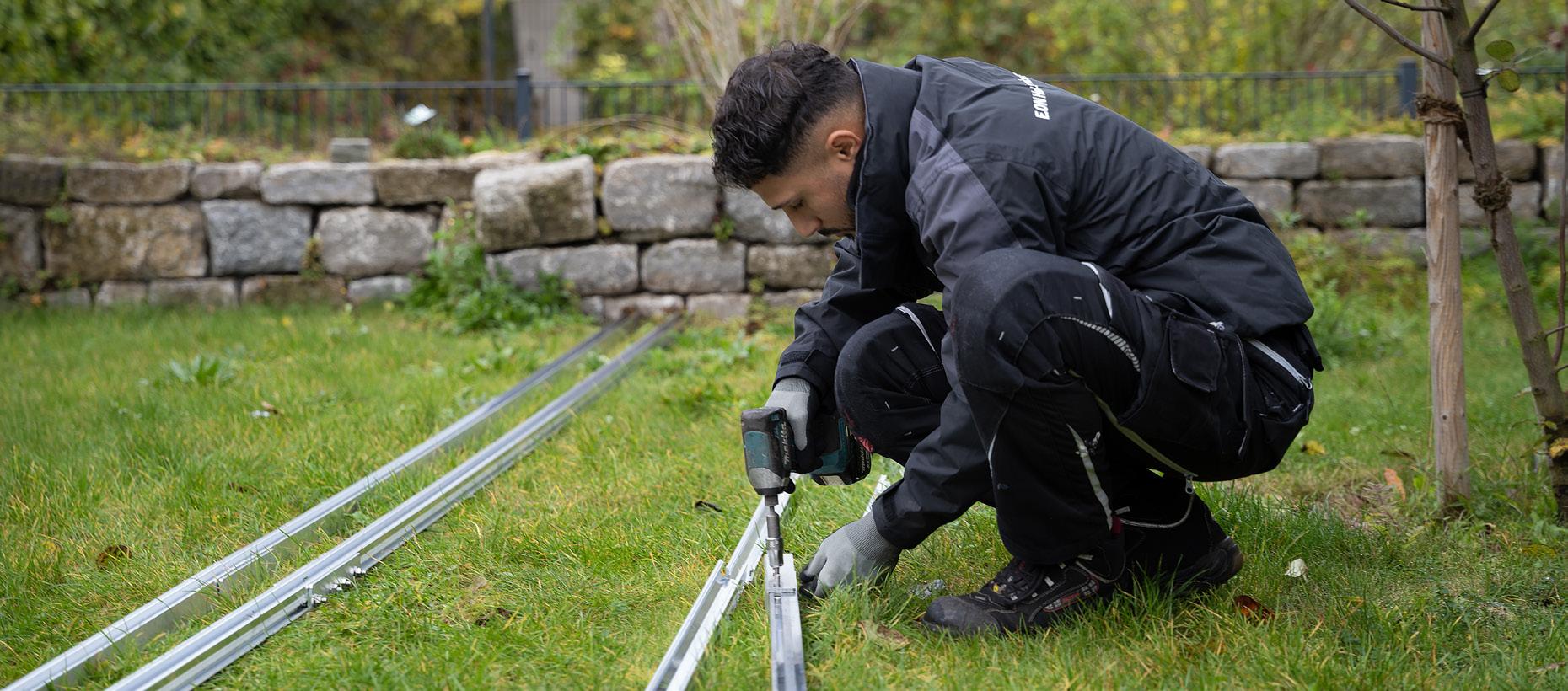
3.4.4. Scaling delivery through people and partnerships
E.ON recognises that delivering sustainable communities depends as much on people as on infrastructure. Its commercial delivery model is tightly linked to workforce capability. Engineers, technicians and project managers act not just installers; they are the front line of the clean building transition.
In response, E.ON has prioritised recruitment, training and workforce inclusion as core to its delivery strategy.
This includes direct investments in skills pipelines, internal promotions and external partnerships, each uniquely integrated with E.ON’s purpose, linking workforce progression to the clean energy transition, local regeneration and inclusion across the sector. At the same time, E.ON is engaging in policy debates around sector-wide skills shortages, recognising that industry-wide capacity gaps are now a national delivery risk.
Partnerships with South Oxfordshire Food & Education Alliance (SOFEA) and Dudley College are helping young people and adult learners access green careers, while E.ON’s Sheffield-based apprenticeships are training future engineers in hydrogen and district heating. Together, these initiatives are building the workforce needed to deliver clean energy for all.

Recognising the commercial pressures many organisations face, E.ON works closely with its partners to build sequenced, viable pathways to a clean energy future.
It offers pragmatic, data-informed guidance on which interventions will deliver returns quickly, like LED upgrades or latent flexibility, and uses those savings to fund deeper decarbonisation over time.
Partnerships with South Oxfordshire Food & Education Alliance (SOFEA) and Dudley College are helping young people and adult learners access green careers.
At a policy level, E.ON is using its insight from more than 17,000 business partners to inform and influence regulatory reform. Its published policy asks, covering grid access, demand flexibility and long-term investment clarity, reflect a grounded understanding of what clients need to participate confidently in the energy transition.
This approach reflects E.ON’s belief in a “growthcentric” energy transition: when businesses cut carbon, they don’t just reduce costs, they also stimulate jobs, community investment and economic renewal.
Entrenched barriers to opportunity cannot be removed in isolation.
E.ON’s partnerships, from cross-industry working groups designing a Social Tariff, to community collaborations like Kids in Sport, to its active role in The Purpose Coalition. demonstrate how progress is accelerated when expertise is shared.
Through combining advocacy with delivery, and by working alongside government, regulators, businesses and communities, E.ON is showing how genuine collaboration can transform both policy and place.
E.ON’s partnerships strategy is anchored in place: ensuring that national objectives are delivered in locally meaningful ways.
Rather than applying a uniform model, the company adapts each initiative to reflect local dynamics, engaging through trusted venues, community networks and civic institutions. This approach builds local legitimacy, breaks down the barriers to opportunity and unlocks deeper social impact.
The Coventry Strategic Energy Partnership continues to deliver both infrastructure and grassroots value. At Henley Green, E.ON volunteers supported the Grub Hub with digital inclusion support, energy advice and discounted food parcels: a practical demonstration of how city-scale partnerships deliver direct benefits for residents.
High-profile collaborations like those with the Coventry Building Society (CBS) Arena and Nottingham Forest Netball have allowed E.ON to embed activity in familiar settings. These partnerships support more than brand visibility: they help forge relationships with civic stakeholders, improve community trust and build the kind of public goodwill that is critical to delivering long-term energy and infrastructure programmes.
At the same time, E.ON is increasing its engagement with local authorities and housing associations to jointly tackle fuel poverty and sustainability. This includes its retrofit programme with Birmingham City Council, where social housing was upgraded with insulation and heat pumps, reducing energy bills for low-income residents and creating local jobs: a model of joined-up delivery with shared community outcomes.
Across its partnerships, E.ON prioritises collaborative, purpose-led storytelling.
Its relationship with Veloce Racing exemplifies this work, evolving into a widespread collaboration to promote diversity in sport, with joint content creation that highlights gender inclusion, youth aspiration and climate awareness.
This framing is not limited to messaging; it translates into real-world opportunity. Through Kids in Sport, E.ON has delivered events in venues like the CBS Arena and schools in London, Liverpool, Nottingham and Sheffield, connecting children to sport, STEM, sustainability and positive role models. Local integration, like bringing Nottingham Forest Netball into school sessions, ensures that national partnerships have local relevance and social value.
These same principles underpin other partnerships, like England Rugby League, underlining its commitment to and support of grassroots sport by offering junior players from Community Rugby League clubs the opportunity to walk out as official mascots for the team at each of the Tests.

Developed through a reimagined partnership with Veloce Racing and supported by Nottingham Forest Netball, the Kids in Sport programme brought together sport, opportunity and local identity.
In 2025, E.ON hosted two major youth engagement events in Coventry and Nottingham, involving over 100 children in total. These events featured interactive sports activities, mentoring from professional athletes and sessions linking sport to STEM careers.
Aligning its brand with genuine social purpose, E.ON is reaching new audiences and reinforcing its commitment to youth development, gender equality and positive representation in sport and energy.
3.5.3. Aligning community support with infrastructure
E.ON continues to evolve its charity and third-sector partnerships, placing greater emphasis on targeted support for households where energy insecurity intersects with wider vulnerability.
Partnerships are expanding beyond energy into health and nature. Partnership with the mental health charity Mind supports colleague mental health literacy and wellbeing on the ground, while work with the Woodland Trust is preserving ancient forests through customer-linked donations. Both underline that inclusion and sustainability are inseparable.
This also includes critical work with Kidney Care UK and Macmillan, with E.ON training its frontline teams to better understand and respond to customers with complex medical needs. This helps to recognise that partnerships in health, housing and welfare are essential to widespread delivery.
This principle is reflected in schemes like the Warm Homes on Prescription pilot: where GPs identified patients at risk of cold-related illness and referred them for insulation or heating upgrades. Through working alongside health professionals and local authorities, E.ON has delivered measurable improvements in both wellbeing and NHS demand: an example of integrated energy-health partnership with demonstrable outcomes.
More broadly, E.ON’s support for grassroots organisations is now delivered through face-to-face channels and local venues like churches, foodbanks and community centres. These relationships enable tailored conversations, including around free insulation, bill support or appliance replacement.
The scheme enabled GPs to ‘prescribe’ energy efficiency improvements to patients vulnerable to cold-related illnesses
Case Study: Warm Homes on Prescription
Recognising the health consequences of fuel poverty, E.ON piloted the Warm Homes on Prescription programme with NHS and local authority partners. The scheme enabled GPs to ‘prescribe’ energy efficiency improvements to patients vulnerable to cold-related illnesses, like respiratory conditions or heart disease.
Once referred, patients received home visits from E.ON’s energy advisors, followed by rapid installation of measures like insulation or heating upgrades. The scheme was designed to reduce hospital admissions and improve quality of life, particularly for elderly or medically vulnerable residents.
Since first being featured in the 2024 Impact Report, early results in 2025 showed a measurable drop in emergency care demand among participating patients, and E.ON is now engaging with policymakers to scale the model nationally.
This local partnership highlights the link between energy policy and public health and demonstrates the value of integrated, cross-sector solutions.
Strategic partnerships in education are a growing area of focus for E.ON.
As mentioned previously, in Liverpool and Sefton, E.ON worked with Hugh Baird College and Peel Ports to equip students with skills for the green economy. Importantly, college partners selected cohorts based on local need: helping ensure the right opportunities reached the right students. This bottom-up model reflects E.ON’s belief that opportunity is best supported through place-sensitive design and collaboration.
Within its workforce, E.ON is also investing in colleague-led inclusion networks and development pathways. As it expands community-facing and engineering-led roles, the organisation is building capacity that is both technically strong and socially representative, reinforcing the importance of partnerships not only with external stakeholders, but internally across teams and functions.
E.ON are also investing in future skills. STEM workshops like “Power to Drive”, and sponsorship of Solihull Pride, complement education and inclusion programmes with colleges and local trusts.
Together, these initiatives show how partnerships can unlock opportunity at every stage of life.
E.ON is also investing in colleague-led inclusion networks and development pathways.
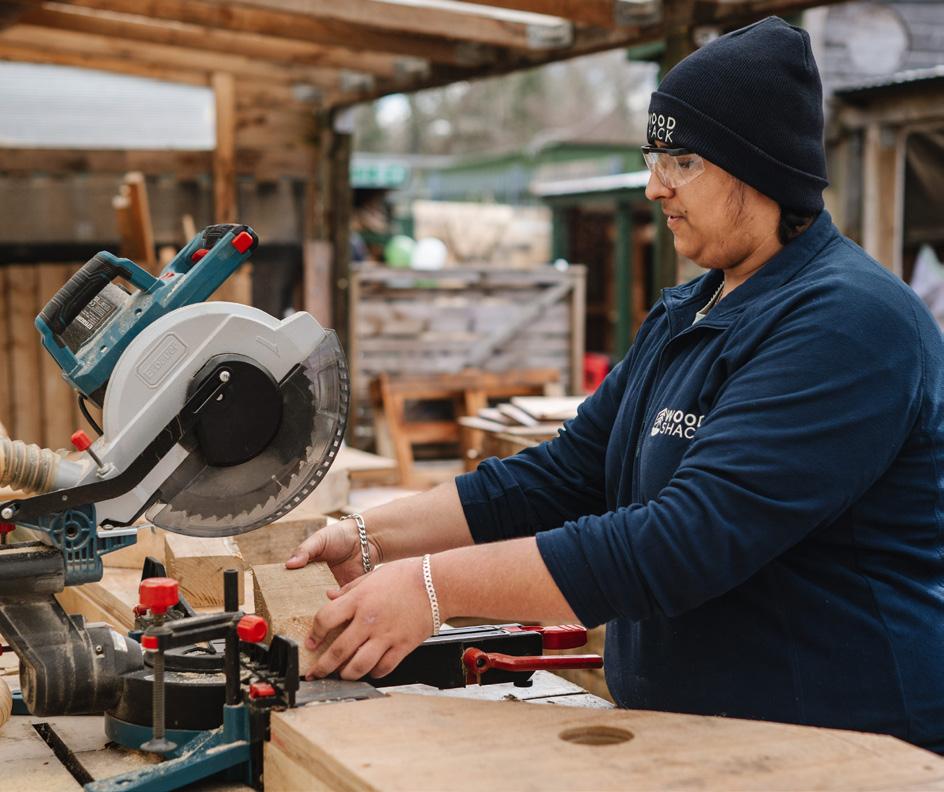
To bridge the gap between education and employment in the clean energy sector, E.ON partnered with Hugh Baird College and Peel Ports in Sefton and Liverpool. The programme introduced a group of students to the technical, behavioural and soft skills needed in the energy transition.
It included a Green Skills Day covering roles in building management systems, engineering, gas and electrical installation, followed by targeted workshops on workplace readiness and transferable competencies. The experience culminated in a site visit to Peel Port’s massive rooftop solar array, including a full technical briefing and health and safety induction.
Students were selected by the college based on need and potential benefit, ensuring that the opportunity reached those who might not otherwise access such experiences.
Achieve equality, through diversity & inclusion
Alongside this report, E.ON has continued to launch its Inclusion Report. The 2025 edition makes clear that powering the future is not only about clean energy but also about creating fair and inclusive opportunities for people. Its focus on lived experience, progressive workplace policies and colleagueled networks shows how E.ON is embedding equity at every level.
For Place, Partners, Progress, these insights are crucial: they demonstrate that the drive to remove barriers and foster belonging within E.ON mirrors the company’s external mission - building partnerships, investing in people and ensuring that the benefits of the energy transition are shared across every community.
3.6.1. Embedding belonging in the workplace
The Inclusion Report 2025 shows how opportunity begins within E.ON itself. Colleague-led networks such as EmbRace, Menopause Matters, and the Pride Network are not only sources of peer support but powerful vehicles for shaping policy and culture.
Awards at both national and European level highlight the external recognition of this work, demonstrating how E.ON’s inclusive practices are being seen as models for wider industry change.
3.6.2.
E.ON has gone beyond statutory requirements to design policies that reflect real lives — from unlimited fertility leave to equal parental leave and nE.ONatal support.
These initiatives are not symbolic: they are practical mechanisms for ensuring that colleagues do not face impossible choices between family, health and career.
For this report, these policies highlight how E.ON treats fairness as infrastructure: a necessary foundation for opportunity everywhere.
Innovations like OffCentre, an immersive experience on hidden disabilities, embody E.ON’s commitment to reshaping understanding across the organisation. Through inviting colleagues to “see the unseen”, these initiatives cultivate empathy and break down invisible barriers: a reminder that opportunity depends as much on culture as on structures.
Through inviting colleagues to “see the unseen”, these initiatives cultivate empathy and break down invisible barriers.
E.ON’s approach to inclusion is built on a simple truth: what happens inside the business shapes what it can deliver outside.
Working with The Purpose Coalition and embedding the Purpose Goals into its culture, E.ON positions inclusion not as a compliance exercise but as a strategic driver of performance and community impact.
The link is clear. Colleague networks and progressive policies create a workforce that is more empathetic, diverse and confident: and that directly translates into better customer support, smarter retrofit delivery, and stronger engagement with schools and local partners. This alignment means that inclusion is not a side benefit but a force multiplier: it strengthens trust, widens access to green careers and makes the energy transition fairer and more effective.
E.ON’s unique advantage lies in this integration. Few companies tie workplace culture so explicitly to national goals on fairness and opportunity. By doing so, E.ON demonstrates that the clean energy transition is not just about technology and infrastructure, it is also about people, and about creating systems where commercial strategy and social progress cannot be separated.

The Inclusion Report 2025 highlights OffCentre, developed by the AdaptAbility Network, which uses sensory simulations to build empathy for colleagues with non-visible disabilities.
From visual impairment goggles to vests replicating chronic fatigue, the initiative creates understanding that policies alone cannot deliver. For Place, Partners, Progress, it demonstrates that the journey to opportunity begins with awareness, equipping colleagues with the empathy needed to shape a fairer energy future.
Colleague networks and progressive policies create a workforce that is more empathetic, diverse
and confident.
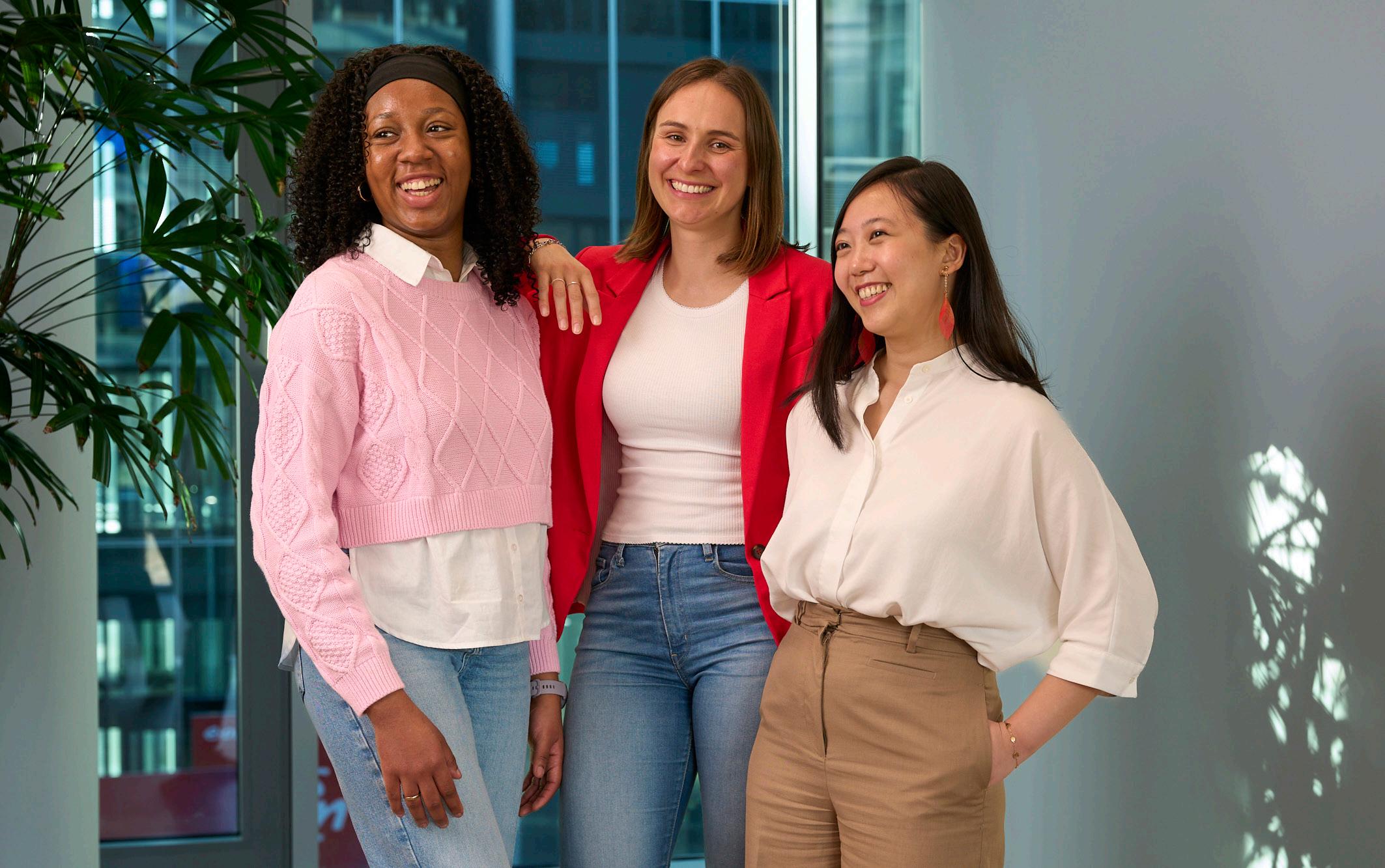
E.ON’s commitment to ensuring that the energy transition delivers both environmental and social value is clear. By embedding purpose at the heart of its operations, the company demonstrates that commercial and social progress must go hand in hand. Its integrated approach, combining immediate relief for households, systemic reform of the energy market and long-term investment in clean infrastructure, underscores how energy providers can act as a force for good while building resilience for the future.
4.1 Supporting Customers and Tackling Inequality
At the centre of E.ON’s work is a recognition that affordable energy is the foundation of wellbeing and opportunity. The company’s Winter Affordability Scheme, Energy Fund and partnerships with organisations like StepChange and Age UK have delivered direct relief to households most affected by the cost-ofliving crisis. Crucially, this support goes beyond short-term intervention - E.ON has consistently advocated for structural reforms, including a permanent Social Tariff, fairer standing charges and the end of prepayment penalties.
E.ON is demonstrating that energy affordability must be treated as both a financial and a public health priority.
By investing in specialist frontline teams, proactive wellbeing checks and communitybased advice centres, E.ON is demonstrating that energy affordability must be treated as both a financial and a public health priority. Its advocacy and action combine to reduce fuel poverty, support vulnerable groups and ensure that no household is excluded from the benefits of the energy transition.
E.ON’s investment in low-carbon infrastructure illustrates how the energy transition can be both ambitious and inclusive. Flagship projects such as the Silvertown ectogrid™, Uskmouth battery storage and the Port of Liverpool solar hub show the scale of its commitment, with £2 billion of UK investment planned through 2028. These initiatives are not only cutting emissions but also enabling new skills, jobs and opportunities in local communities.
Importantly, the company recognises that digital innovation must not widen inequality. From passive battery pilots in Coventry to shared rooftop solar for flats through SolShare, E.ON is embedding fairness into the design of its energy systems. By coupling technology with education initiatives, like the New Energy Academy and school partnerships, the business ensures that green innovation is accessible and relevant to everyone. This approach highlights how clean energy must be delivered with fairness at its core, ensuring the transition does not deepen existing divides.
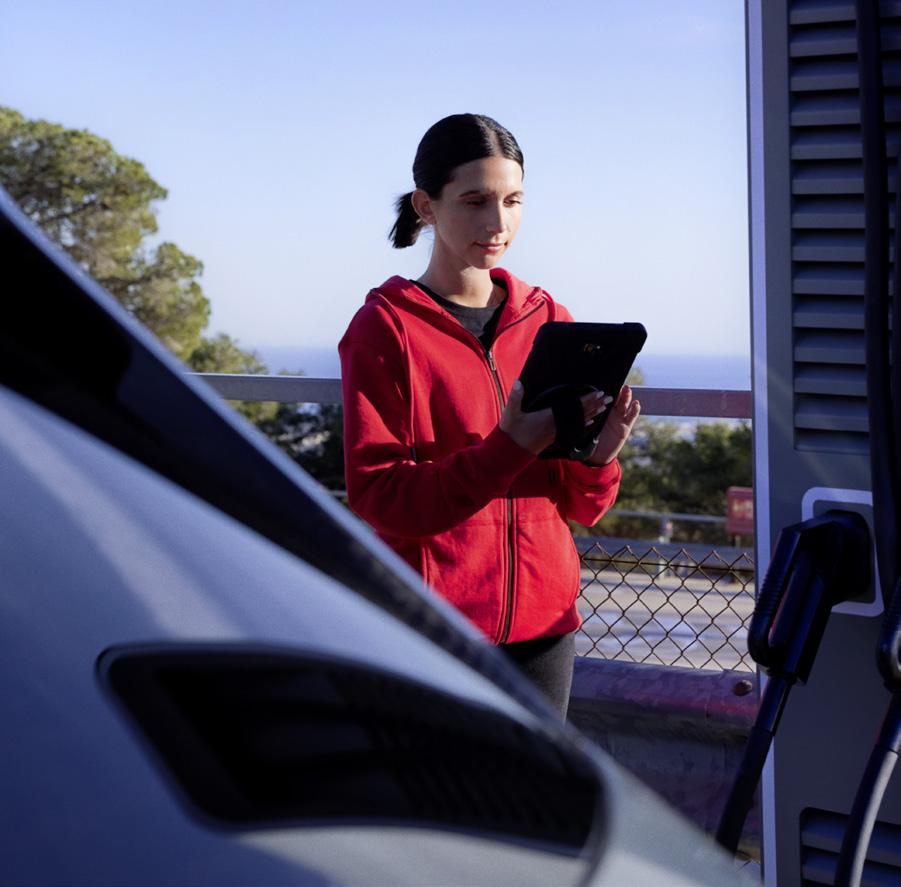
Embedding inclusion into its own workplace culture, through progressive policies, colleague-led networks and digital skills programmes.
4.3 Strengthening Communities Through Partnerships
E.ON’s purpose-led partnerships illustrate the transformative impact of collaboration between business, Government and communities. Long-term initiatives, such as the 15-year Strategic Energy Partnership with Coventry, combine infrastructure delivery with literacy programmes, skills training and student engagement, demonstrating how decarbonisation can also foster social mobility.
The company’s community impact is further visible through grassroots collaborations: from sport-based engagement initiatives like Kids in Sport, to the Warm Homes on Prescription pilot linking energy and health outcomes. These examples show how E.ON is not only decarbonising infrastructure but also strengthening the social fabric of the places it serves.
By embedding inclusion into its own workplace culture, through progressive policies, colleague-led networks and digital skills programmes, E.ON extends the same principles of fairness and opportunity internally that it champions externally. This integration of workforce development, community engagement and infrastructure investment reinforces its position as a company that delivers impact at every level of society.

E.ON’s journey over the past year has demonstrated that progress is possible when commercial ambition and social purpose move forward together. To ensure that the benefits of the clean energy transition are widely and fairly shared, E.ON commits to the following priorities:
1. Championing Fairness in the Energy Market Energy is a basic necessity, yet too many households face unaffordable bills or unfair market structures. By pushing for a permanent Social Tariff and reforms to standing charges and loyalty penalties, E.ON will continue to advocate for a system that puts consumers first. Recognising energy efficiency as national infrastructure ensures long-term affordability while supporting growth and clean energy delivery.
2. Strengthening Communities and Partnerships
The clean energy transition must be rooted in place, delivering benefits that are visible and meaningful to local people. E.ON will scale proven models like the Coventry Strategic Energy Partnership, combining infrastructure with education, skills and wellbeing. From Warm Homes on Prescription pilots to grassroots collaborations, partnerships will remain central to tackling fuel poverty, building resilience, and ensuring no one is left behind.
By championing reforms to create a fairer market, leading pilots that test inclusive technologies, and contributing evidence to national debates, E.ON is using its voice and expertise to influence lasting change.
3. Delivering Investment with Purpose
E.ON’s £2bn investment plan represents one of the largest clean energy programmes in the UK. Every project will be designed not only to cut carbon but also to create jobs, apprenticeships and long-term community benefit. By embedding social value into contracts, supporting businesses with viable decarbonisation pathways, and publishing transparent impact reporting, E.ON will demonstrate how commercial delivery and social progress reinforce one another.
4. Innovation, Advocacy and Thought Leadership
E.ON recognises that progress requires more than delivery on the ground — it also depends on reshaping the systems, policies and ideas that guide the energy transition. By championing reforms to create a fairer market, leading pilots that test inclusive technologies, and contributing evidence to national debates, E.ON is using its voice and expertise to influence lasting change. This combination of innovation and advocacy ensures that the transition to clean energy works not just for early adopters, but for every household, business and community.
E.ON believes that the transition to clean energy must be both accessible and affordable. These commitments demonstrate that clean energy is not just an environmental necessity, but a driver of wellbeing, opportunity and renewal for every household, business and community. By working with partners across the UK, E.ON will continue to break down barriers, deliver social value, and ensure that new energy works - for everyone.

The Purpose Coalition campaign is proudly run by This is Purpose, part of Crowne Associates. Copyright © 2025. Crowne Associated Ltd is a corporate affiliate member of the Chartered Institute of Public Relations, and reports lobbying activities to The Office of the Registrar of Consultant Lobbyists, in line with the Transparency of Lobbying, Non-Party Campaigning and Trade Union Administration Act 2014. You can read our Code of Conduct at crowneassociates.uk/code-of-conduct.

